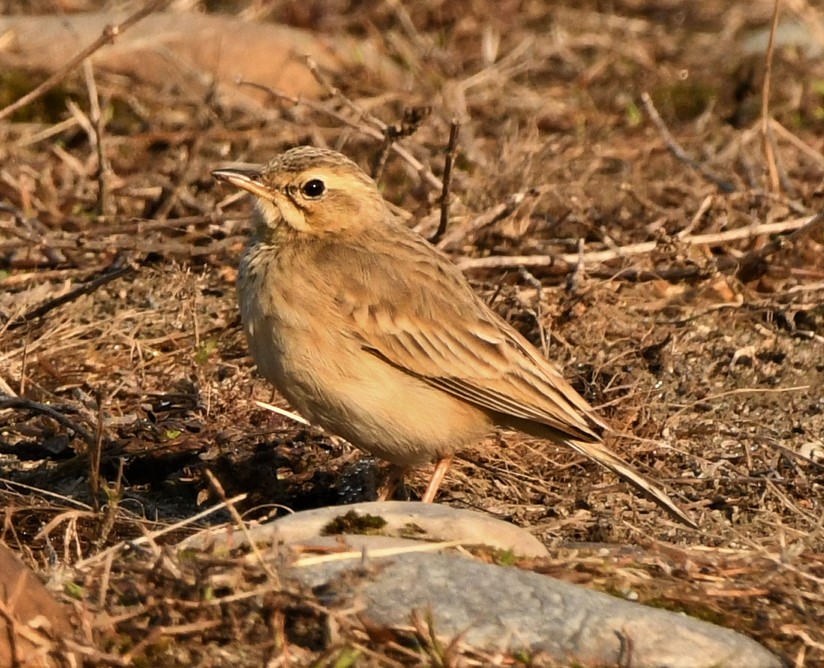UTTARAKHAND, INDIA January 21-25, 2019 Callyn Yorke
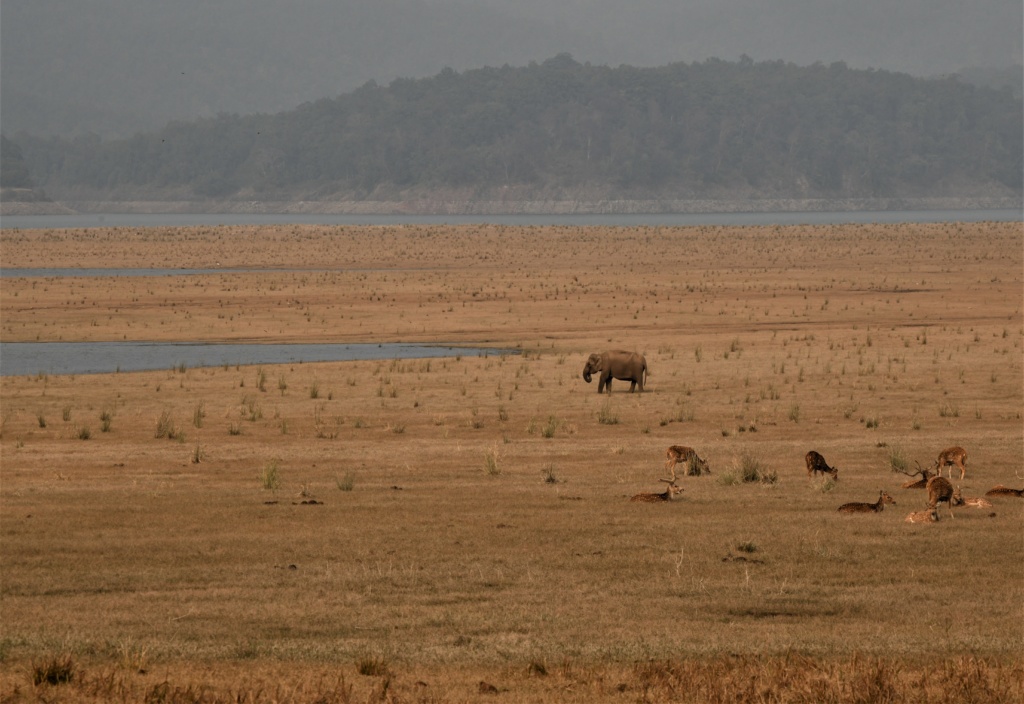
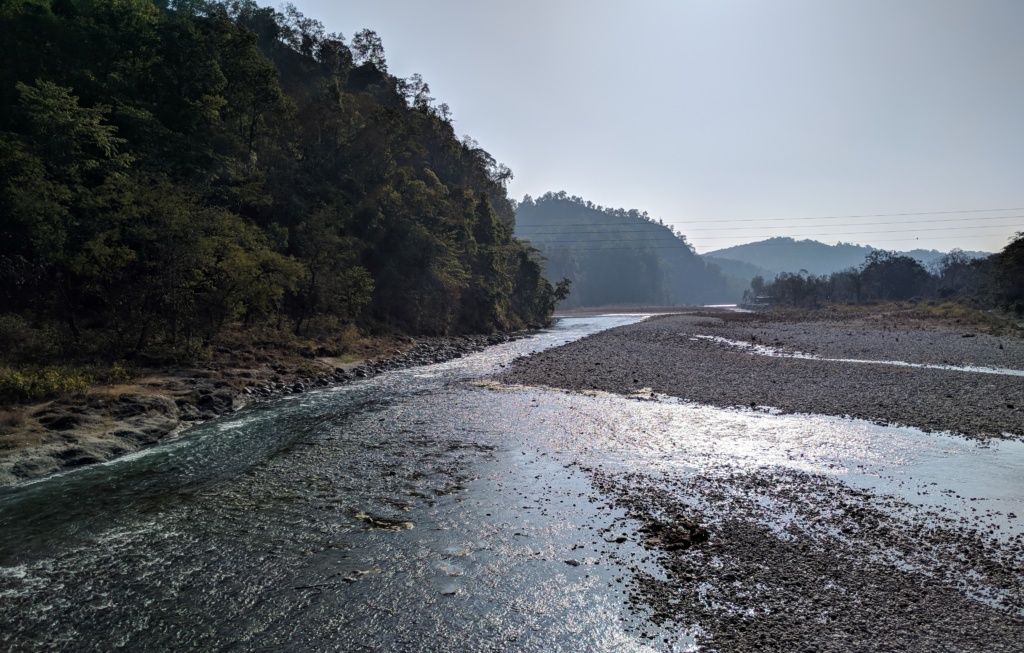
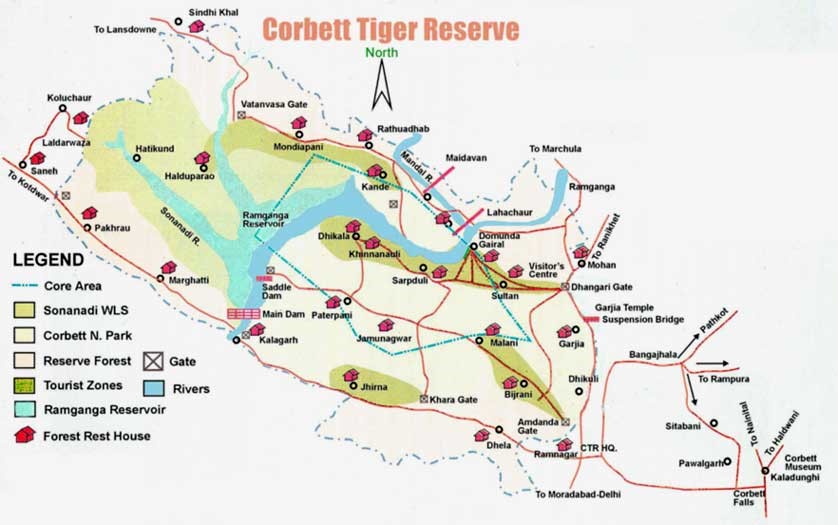
This was a brief visit to Northern India, planned as a break from field studies in Vietnam. My goal was to observe and photograph as much of the wildlife and scenery as possible in Jim Corbett National Park, known locally as “Corbett Tiger Reserve.” Naturally, catching a fleeting glimpse of the elusive Bengal Tiger, with even a blurry
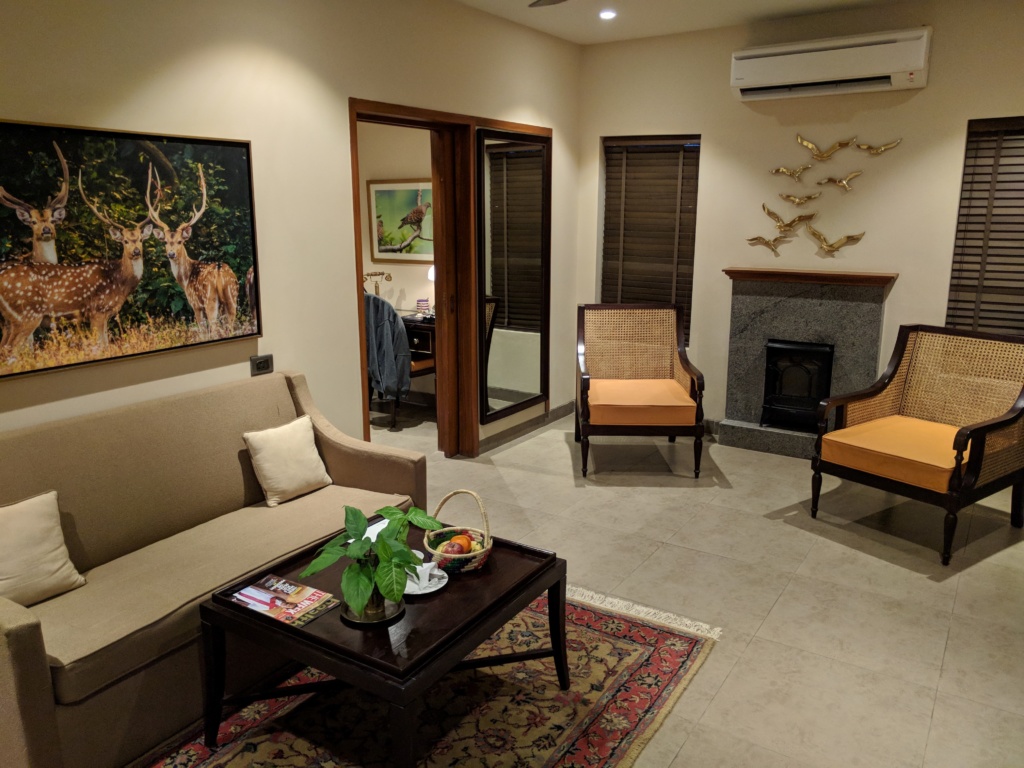
I arrived by car at the Taj Corbett Lodge, Ramnagar, Uttarakhand, at daybreak on January 21. It was a bumpy, hair-raising, five-hour trip from the New Delhi airport, on, narrow, partially paved roadways. Once released from the traffic congestion of downtown Delhi, we sped by many half-constructed buildings, overpasses, open pits, disabled vehicles, pedestrians, dogs, — a surprising array of obstacles in what appeared under the occasional dim street lights as a post-war apocalypse. This was a transect of the gritty and desperately poor India. Where I ended the journey was an oasis of luxury and comfort. Porters wearing turbans bowed with reverence as I entered a set of imposing wooden gates. It was as if I had just shot and killed the man-eating tiger that had terrorized their village for two years.
One of the smiling staff handed me a cool drink. My first thought was, if anyone could promise that I will see a tiger, it would be these folks, whom all behaved like they had just materialized from Aladdin’s lamp.
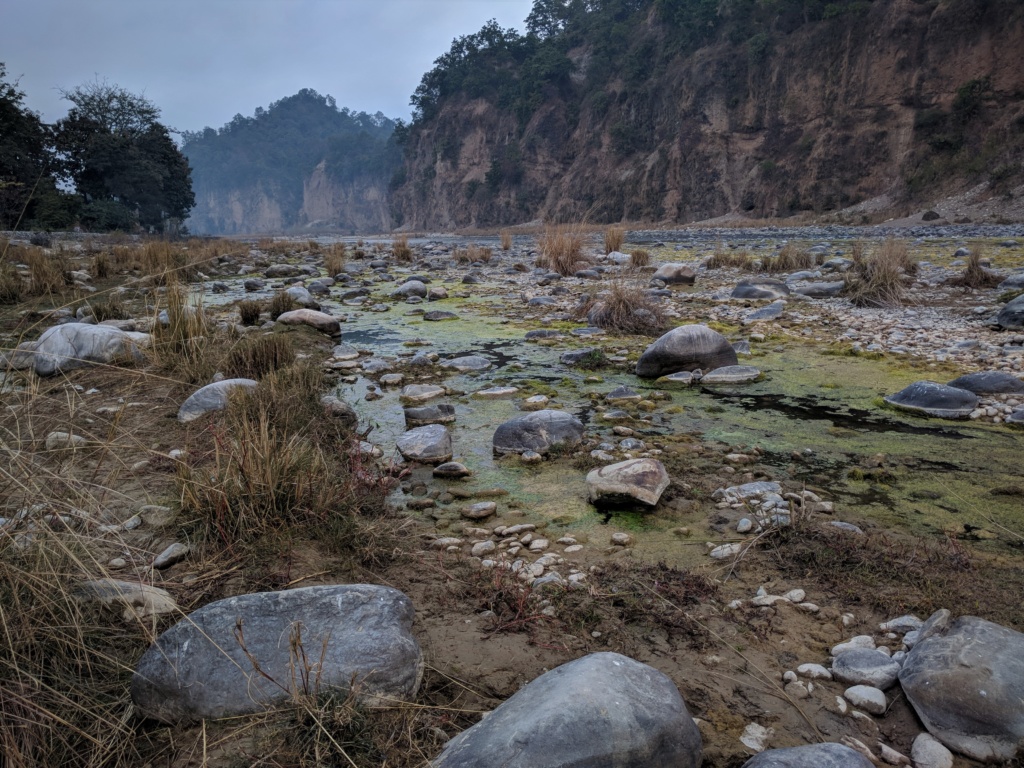
Reality check. Because I had not prebooked the government jeep safari dates, the Taj genies warned me I might not even get into the park at all. Strict rules are enforced by park officials regarding reservations: all must be arranged and paid in full at least 24-hours in advance. A jeep, driver
After a failed attempt to doze off in my room, distracted by a large picture window overlooking shoals of the Kosi River and with many novel bird sounds wafting in from the Taj garden, I was met by a staff member who informed me that my bookings for a series of morning and afternoon jeep safaris had been arranged. He added, cheerfully, that the group of tourists who went to the park this morning had seen a female tiger with two cubs. Wow! With renewed energy, I spent the remainder of the morning and part of the afternoon birding the riverside and lodge grounds, which produced an astonishing variety of species, including some lifers, e.g. Jungle Babbler and White-crowned Redstart. Indeed, some of the best birding and wildlife photography in the entire JCNP area was within a 10-minute walking radius of my room. Half delirious from sleep deprivation, I soon fell in love with India.
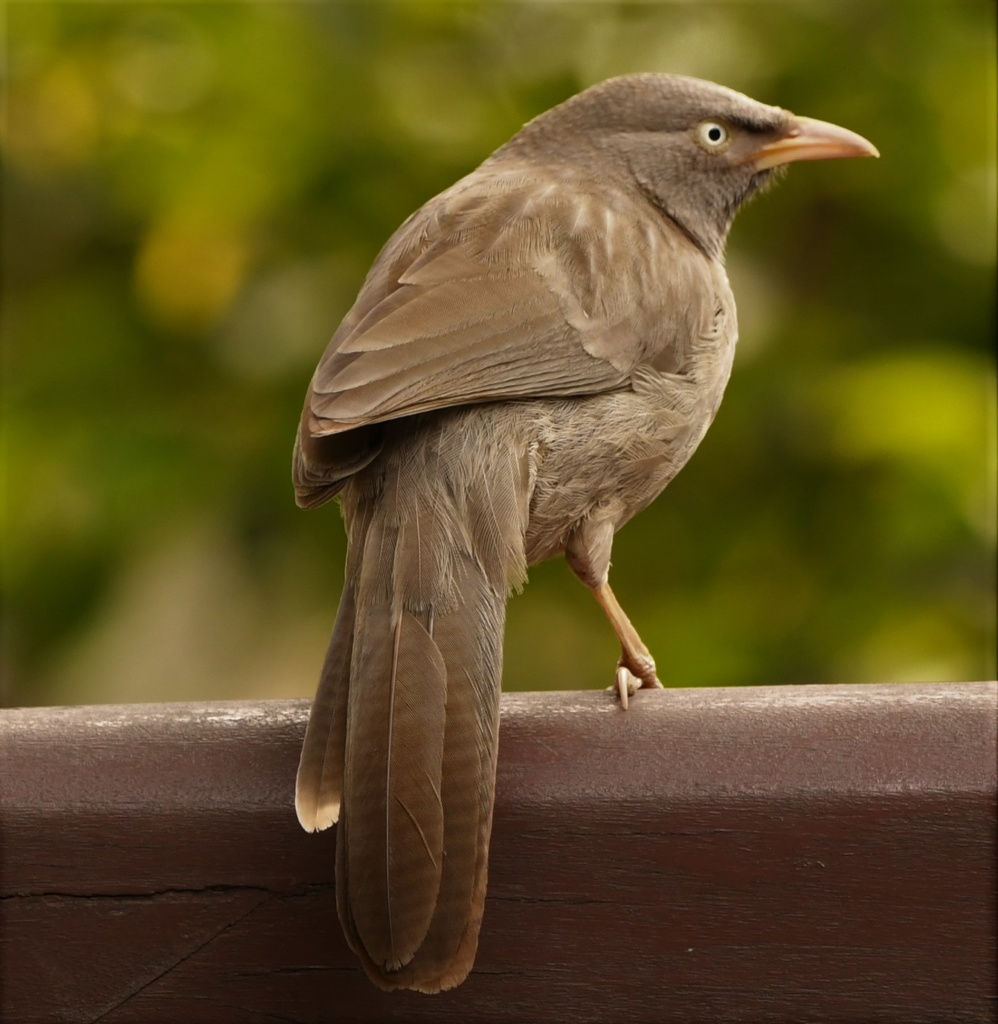
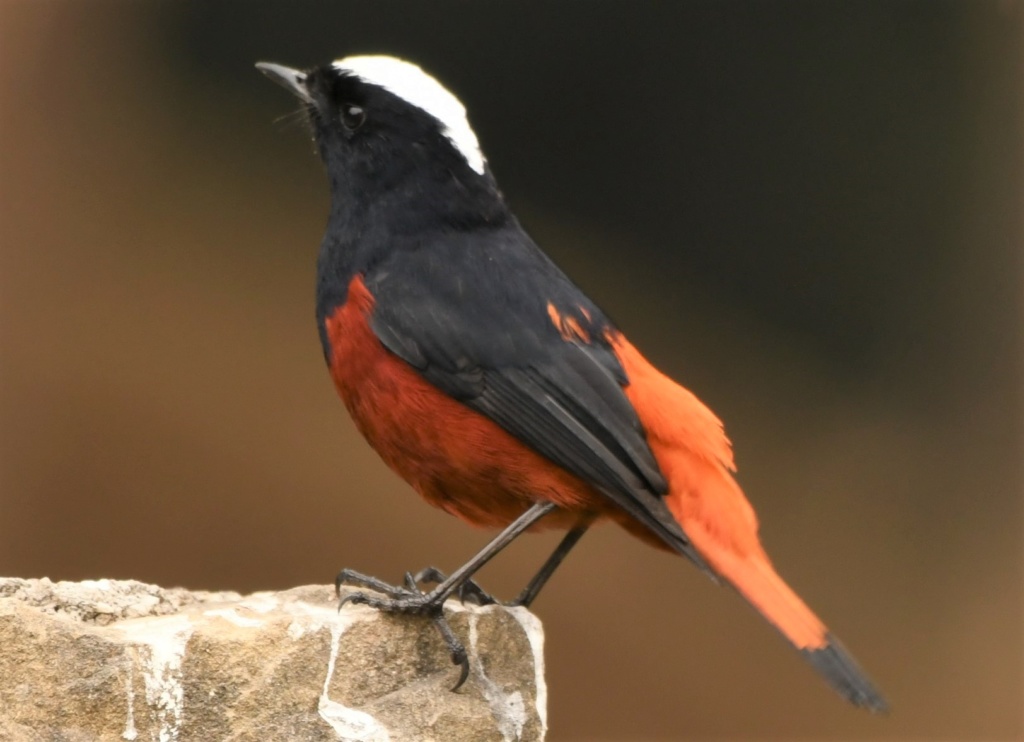
The lodge grounds were also home to a small, lively troupe of Terai Gray Langur (Semnopithecus hector). These handsome primates initially seemed to enjoy a free-run of the lodge grounds, spending much of the time in fruiting trees and shrubs. However, it soon became apparent that the lodge staff was unhappy with these animals, which were regarded as pests. A specially trained dog and long sticks were used to keep the langurs away from outdoor dining areas, resulting in most of the troupe warily occupying roof-tops and tall trees out of harm’s way.
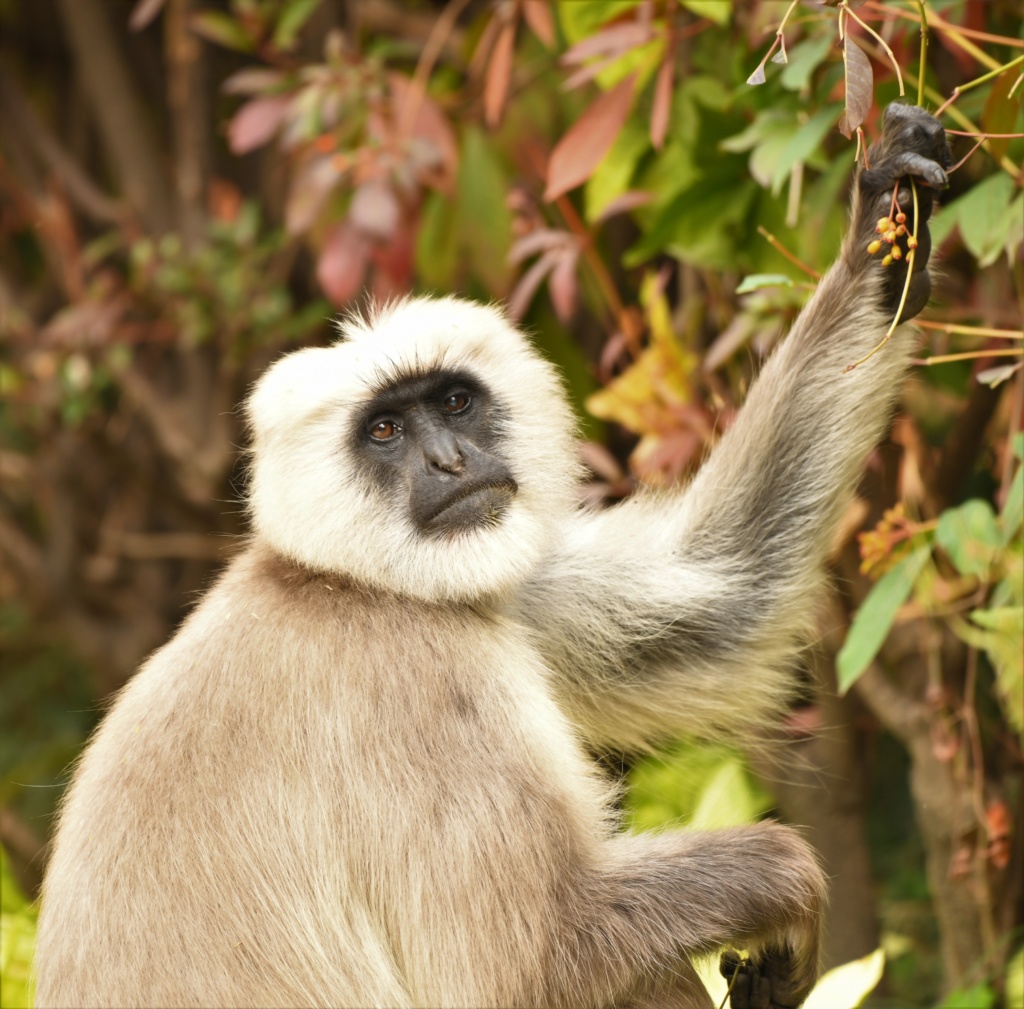
A series of morning and afternoon jeep safaris began the following morning, January 22, with my guide, Kunwar, and a driver. We entered the Bijrani area in the southeastern section of JCNP, registered with a park ranger and proceeded to drive slowly on unpaved roads through a patchwork of gallery forest, riparian, savanna and grassland, transected by rocky streams. Several tourist jeep parties were present, often creating traffic jams when noteworthy wildlife was sighted.
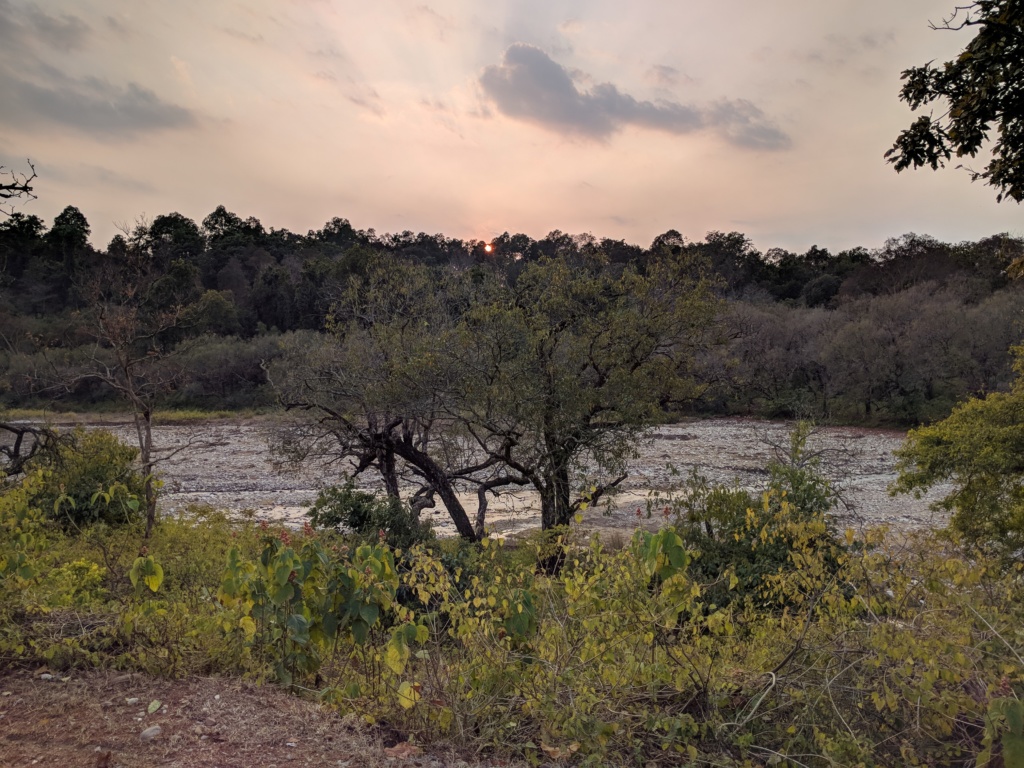
Jim Corbett National Park (elevation 433-1,330m), named in honor of an early 20th-century tiger hunter turned writer/conservationist (Jim Corbett, 1875-1955), was established in 1936 and is the oldest park in India. Covering an area of 520 km2, it has never been
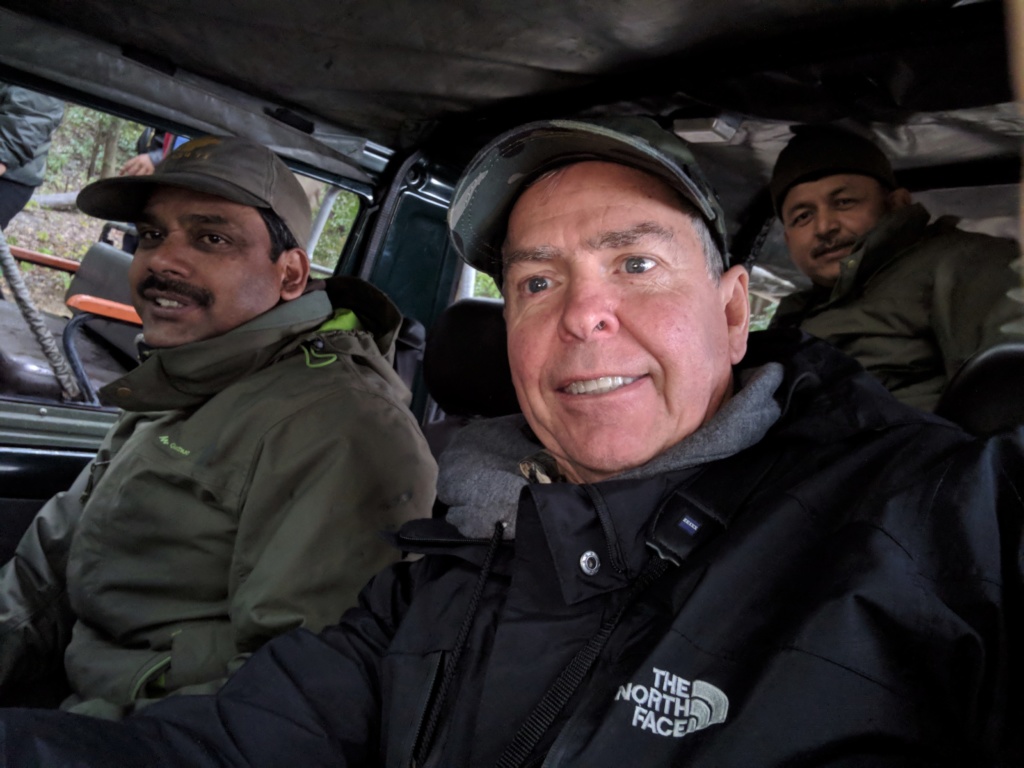
I made a total of five overland safaris in JCNP; three in Bijrani (using different roads), one in Dhikala and one in Jhrina. All of those areas had different topography, vegetation, and most notably, birdlife (see annotated bird list below). Bijrani seemed to have the greatest diversity of species, as expected, due to habitat heterogeneity. It was also the sector with recent tiger sightings. The Dhikala safari was an afternoon tour group aboard a high-clearance, diesel truck with bench seats and the most rigid suspension imaginable. By the end of a punishing 4-hour tour, covering nearly 120 km of secondary roads (some little more than a stream bed), a few of us wondered if a jacuzzi and massage should have been included in the package deal. The good news was, Dhikala supported quite a few birds and other wildlife I had not seen elsewhere, e.g. Indian Hog Deer (Axis porcinus), Kalij Pheasant (Lophura leucomelanos), nesting Pallas Fishing Eagle (Haliaeetus leucoryphus) and River Tern (Sterna aurantia). The Dhikala tour included a lunch stop at a ranger station enclosed by an electric fence, overlooking the scenic Ramganga reservoir and plains. The return trip passed the spot where a British birder, David Hunt was killed by a tiger on February 22, 1985. Since then, visitors to JCNP are not allowed to walk in the park without a certified ranger. The park service isn’t joking about the rule.
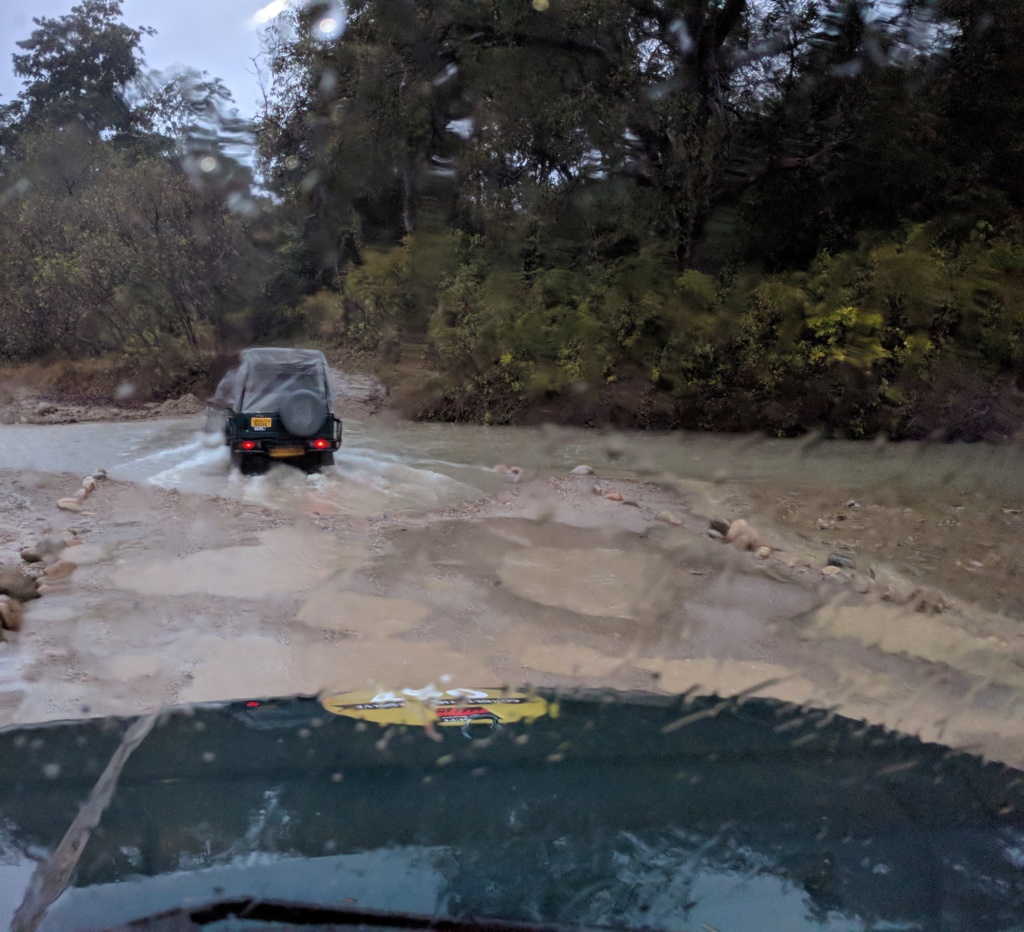
While on our jeep tour in Bijrani, we made a 15-minute potty stop at a fenced-in ranger station. I wandered around for a few minutes looking at birds. One bird in particular (Prinia sp.), caught my eye in some shrubs outside the electrified enclosure. There was a much better view of it near an open gate, which I approached slowly, camera in hand. Just as I was aiming the camera at the bird, now clearly in view, an outburst of shouts and whistles sounded in the distance. Oops. Evidently, the open gate was being closely watched by a number of park personnel. I scampered back to the jeep; recess was over.
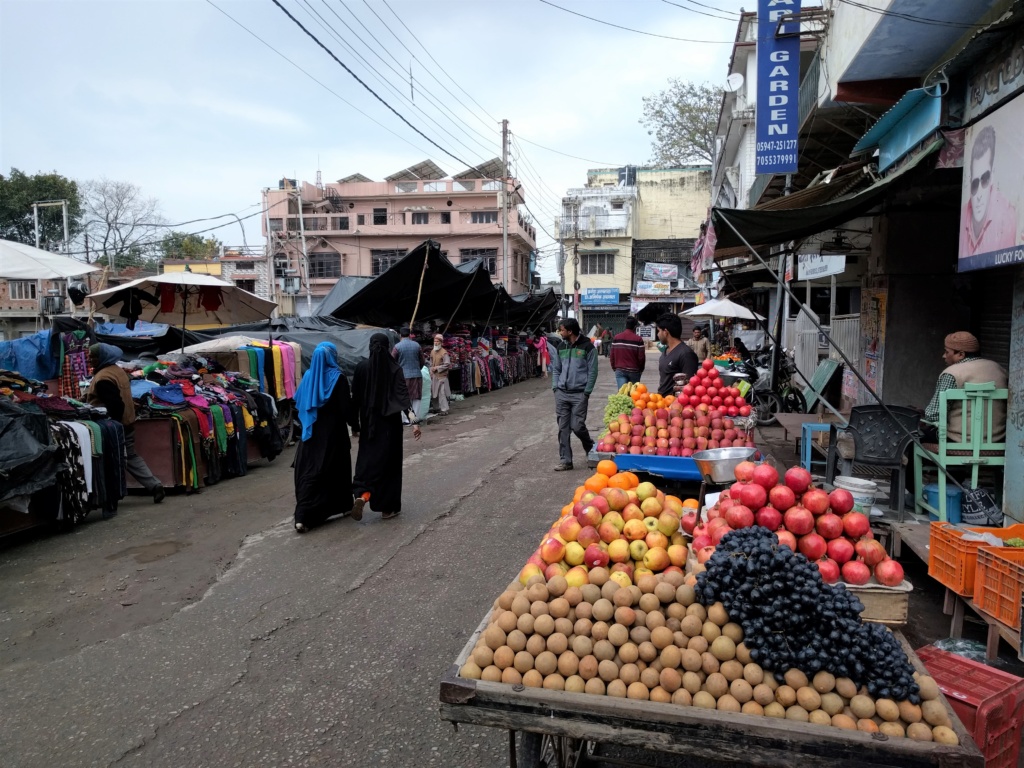
Our last jeep safari was in the Jhrina section of JCNP on 24 January. The route to the main gate passed through the densely populated town of Ramnagar, historically an important trading center connecting the southern Himalayan and northern plains communities. These days, JCNP provides government jobs and a thriving tourist economy. There was a lively, colorful market, many Moorish-style storefronts along narrow streets, and hoards of pedestrians, motorbikes, carts with clothing and produce.
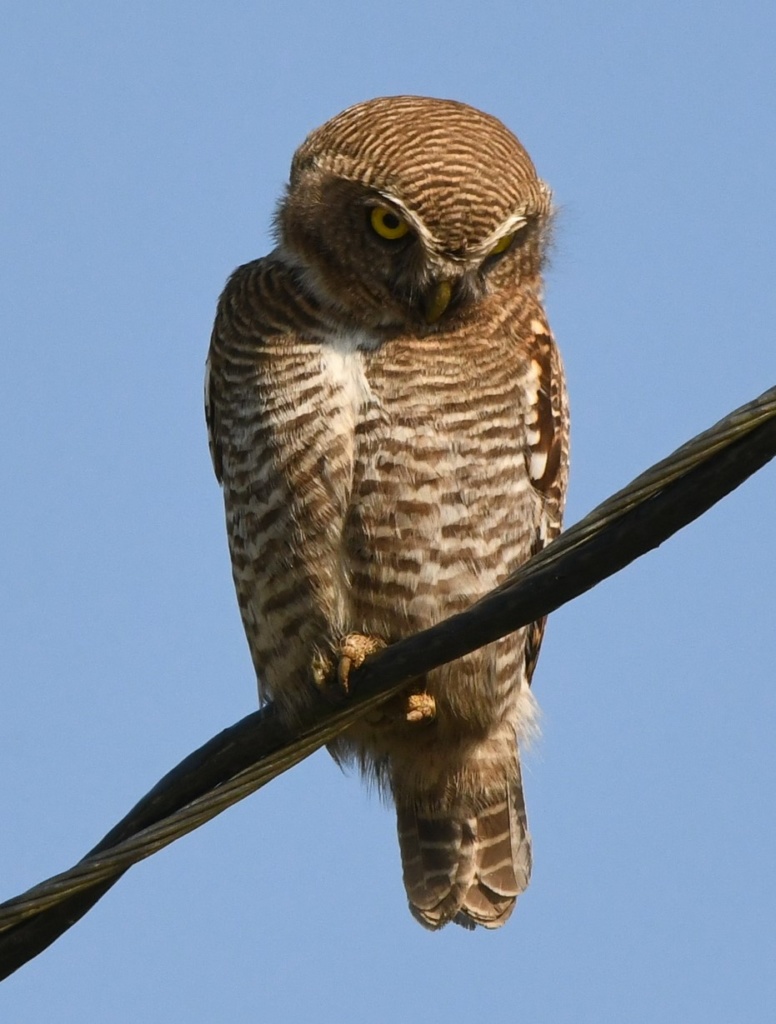
Jhrina, featuring a patchwork of forest, river beds, bluffs and savanna, was the best section of the park for birds of prey. Near the entrance we observed Jungle Owlet, Himalayan Griffon Vulture, Cinereous Vulture and Crested Serpent-Eagle — all within camera range. The previous day, a pair of adult tigers had been spotted by tourists. Since this would probably be my last opportunity to search for a tiger in JCNP, we spent most of the time on the roads traversing habitat where we might find one. Kunwar and our driver, keenly aware of my fading hope of seeing and photographing a tiger in the wild on this trip, stopped the jeep frequently to scan the grasslands, stream beds and forest roadways. No luck. We were running out of daylight as well; the park would be closing in about an hour. Up ahead on the road, a jeep full of photographers had stopped; the occupants were aiming their long-lenses in the same direction. This might be good, we all thought, and pulled up quietly alongside of them; within minutes, another jeep full of tourists crept up from the rear.
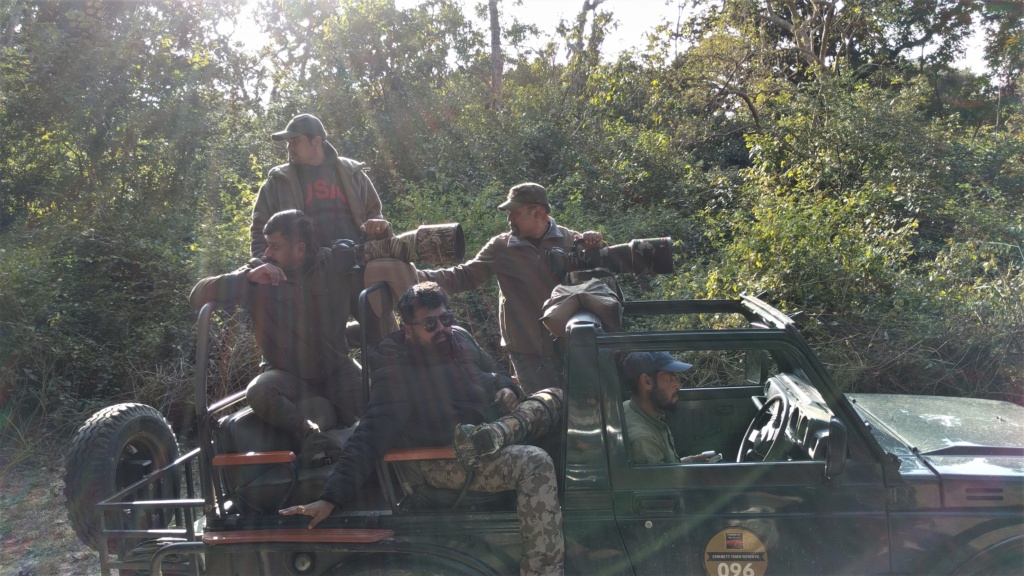
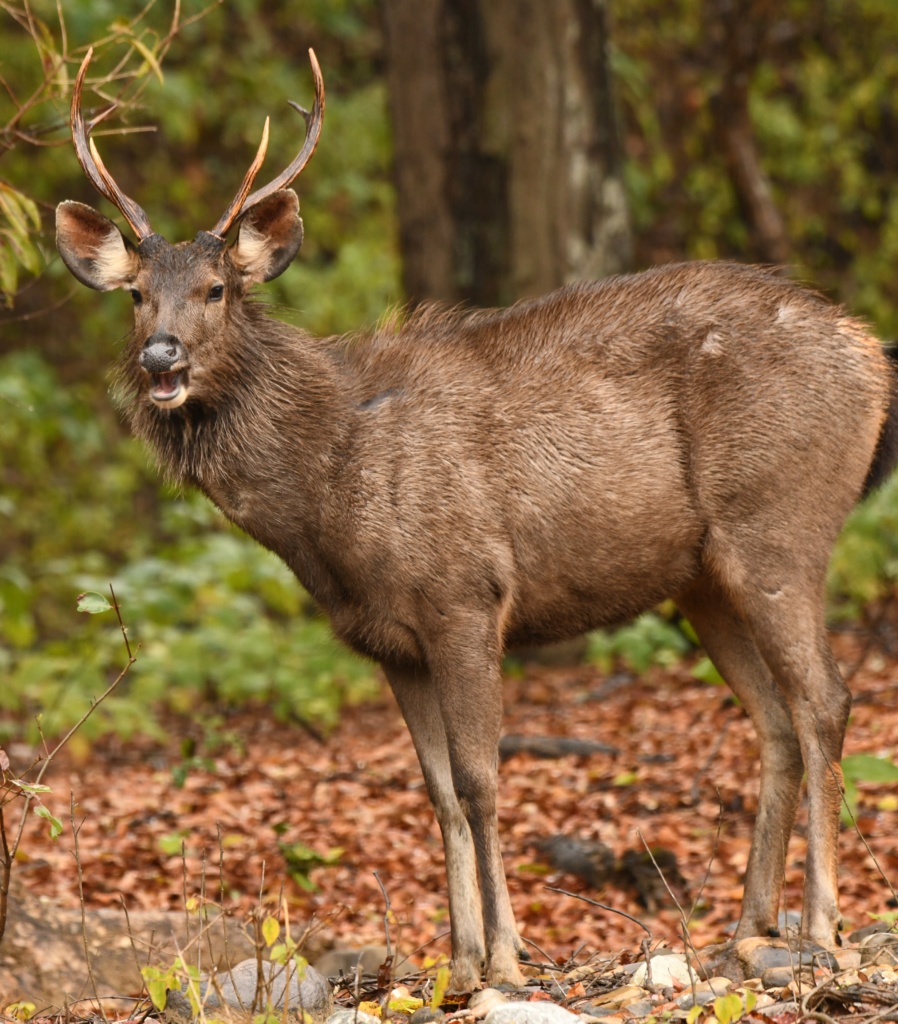
After about twenty minutes of waiting in silence, our attention was heightened by some strange, bellowing noises coming from the roadside jungle. These were loud groans and grunts, the likes of which I had never heard. Kunwar said that the sounds were those made by copulating tigers. If so, it would be difficult to conclude the two animals enjoyed each other’s company. Evidently, we were eavesdropping on a lively courtship dispute. Several more minutes passed before another series of similar noises occurred, again coming from close by in the dense tangle of vines and seedling undergrowth. The proximity of the sounds made the wait both tedious and thrilling, like soldiers in a bunker awaiting a full-frontal assault. The hope was for the tigers to finish their mating ritual, perhaps have a little cat-nap, then come out for an afternoon stroll on the roadway. But that never happened. We stayed as long as we dared, then raced back to the main gate just before closing time. Hmm. I wondered if mammal-watching protocol was similar to sport-birding, regarding an all important check mark in the species box. In the end, amorous vocalizations of an unseen pair of tigers, were all of that magnificent beast I would encounter on this visit to India. Nonetheless, I reckoned there was a cause for celebration.
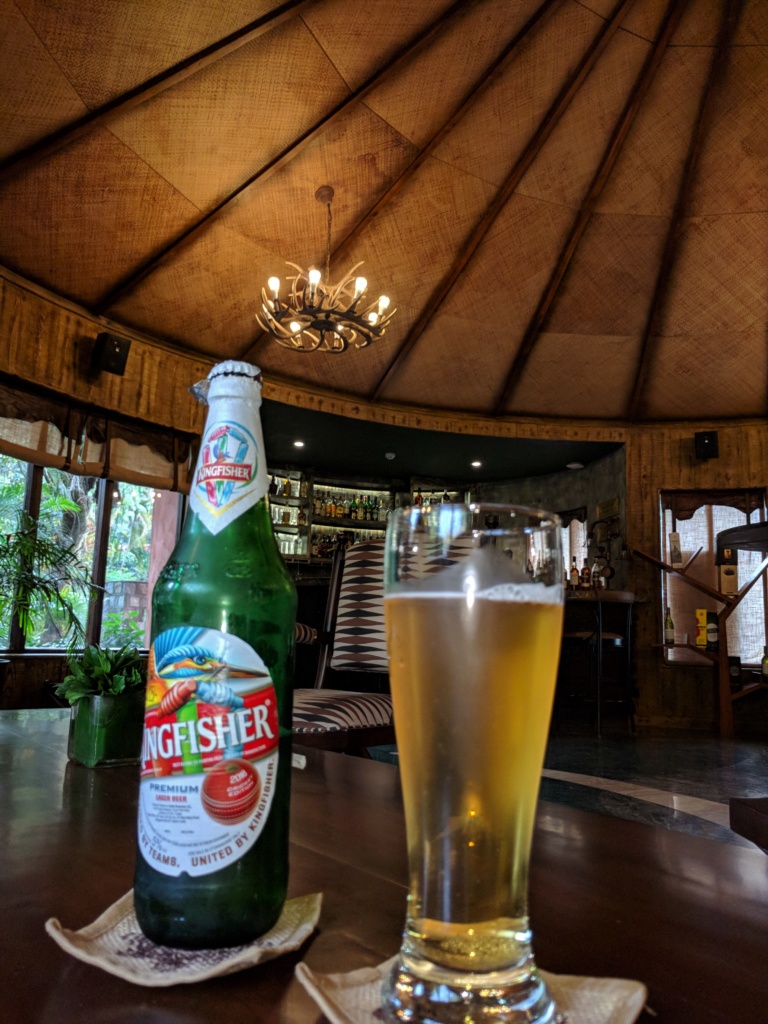
ANNOTATED BIRD LIST
Key to Locations and Abbreviations
BI = Bijrani, JCNP; DH = Dhikala, JCNP; JCNP = Jim Corbett National Park; JH= Jhirna, JCNP; KOS = Kosi River; MR = main road bordering JCNP;RAM = Ramnagar city and village; RAMK = Ramnagar at Kosi River; RAMRS = Ramnagar Reservoir (Dhikala); TAJ = Taj Corbett lodge gardens; UBQ = Ubiquitous.
Ad = adult; Imm = Immature; N = nesting; msf= mixed species flock; 1,2,3… maximum number per survey.
Gray Francolin (Francolinus pondicerianus) 2 roadside brush, JH.
Red Junglefowl (Gallus gallus) 2 (m,f) JH.
Kalij Pheasant (Lophura leucomelanos) 3 (m,f) roadside brush, DH.
Indian Peafowl ((Pavo cristatus) 12 UBQ.
Ruddy Shelduck (Tadorna ferruginea) 10 KOS, DH, RAMK, RAMRS.
Striated Heron (Butorides striata) 1 JH, TAJ.
Indian Pond Heron (Ardeola grayii) 5 UBQ.
Gray Heron (Ardea cinerea) 1 DH.
Great Egret (Casmerodius albus) 2 DH.
Intermediate Egret (Mesophoyx intermedia) 3 DH.
Little Egret (Egretta garzetta) 10 UBQ.
Little Cormorant (Phalacrocorax niger) 8 RAMK, 3 DH.
Indian Cormorant (Phalacrocorax fuscicolis) 5 DH, KOS, RAMK.
Peregrine Falcon (Falco peregrinus) 1 TAJ – KOS.
Black-winged Kite (Elanus caeruleus) 1 DH.
Black Kite (Milvus migrans) 2 TAJ-KOS, RAMN, RAMK.
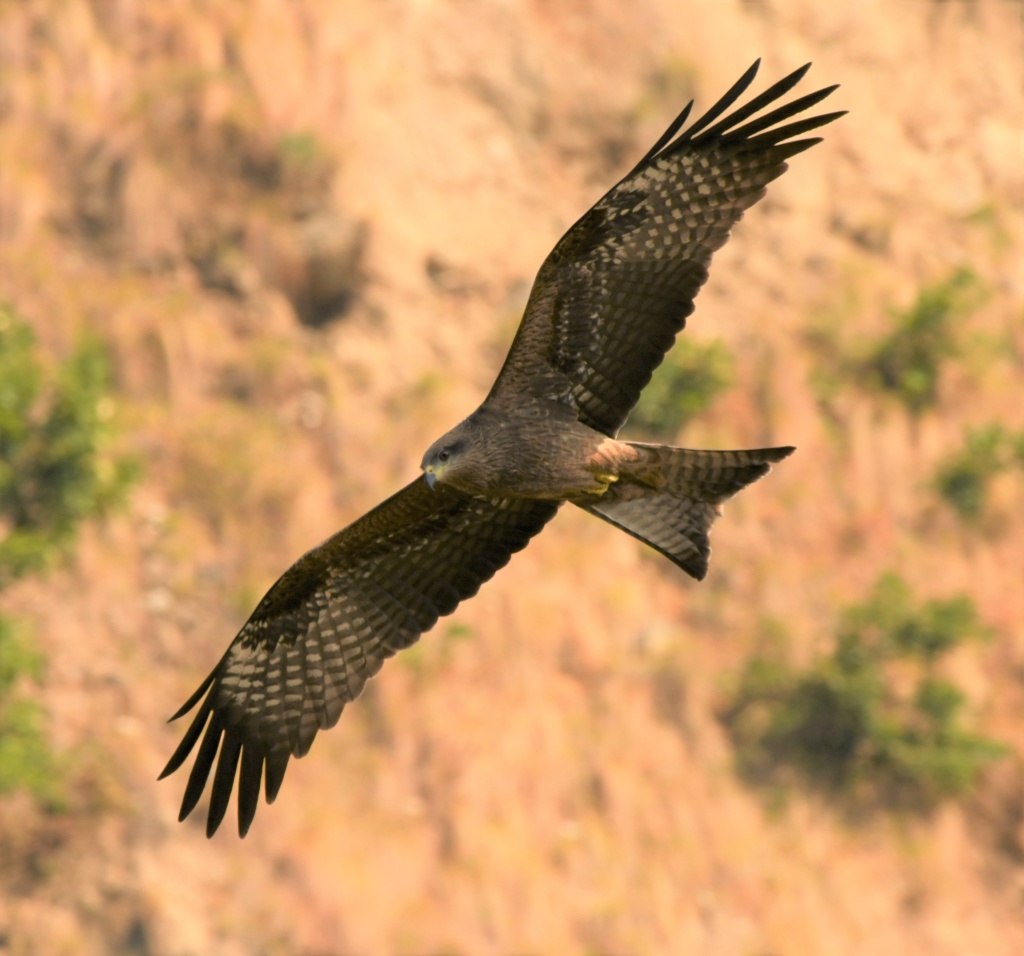
Osprey (Pandion haliaetus) 1 DH.
Pallas’s Fish-Eagle (Haliaeetus leucoryphus) 2 ad; vocal; nesting at top of dead tree, DH (photo).
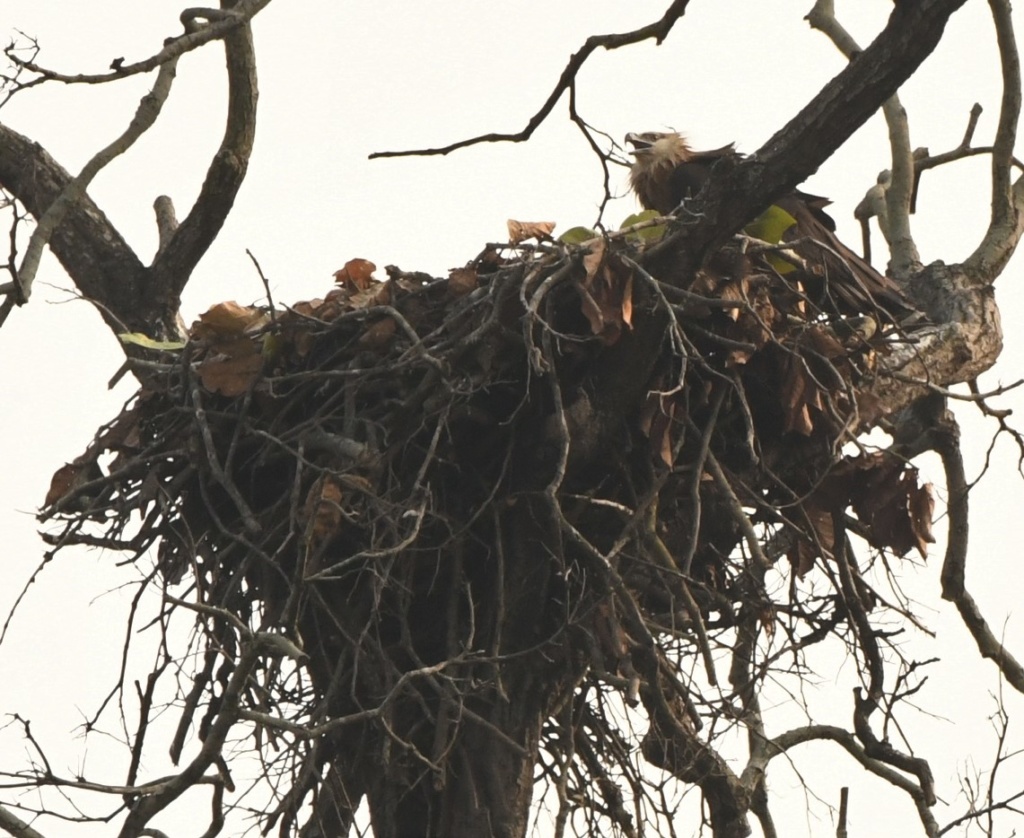
Himalayan Griffon Vulture (Gyps himalayensis) 1 soaring above bluffs, JH.
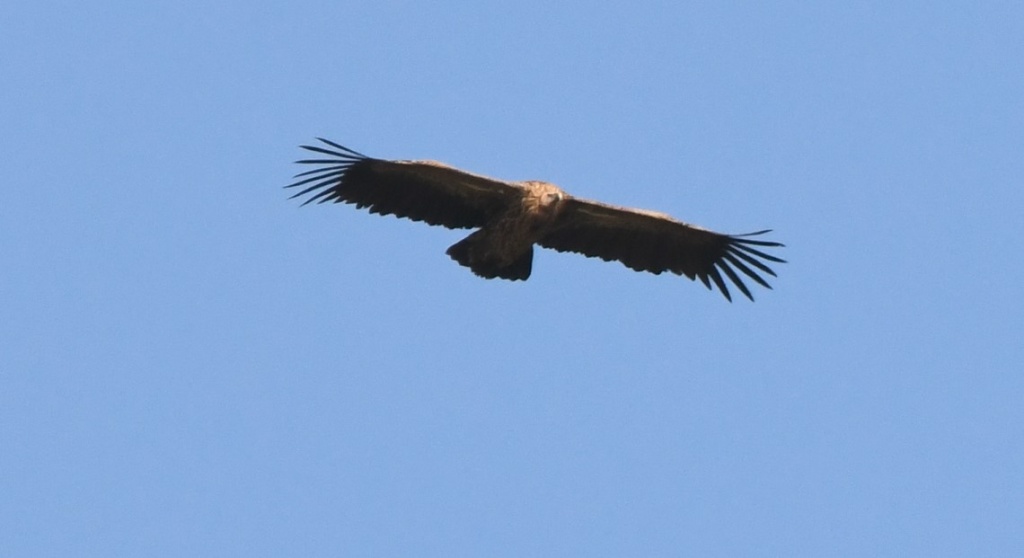
Cinereous Vulture (Aegypius monachus)1 JH.
Crested Serpent-Eagle (Spilornis cheela) 2 BI (photo), DH, JH.
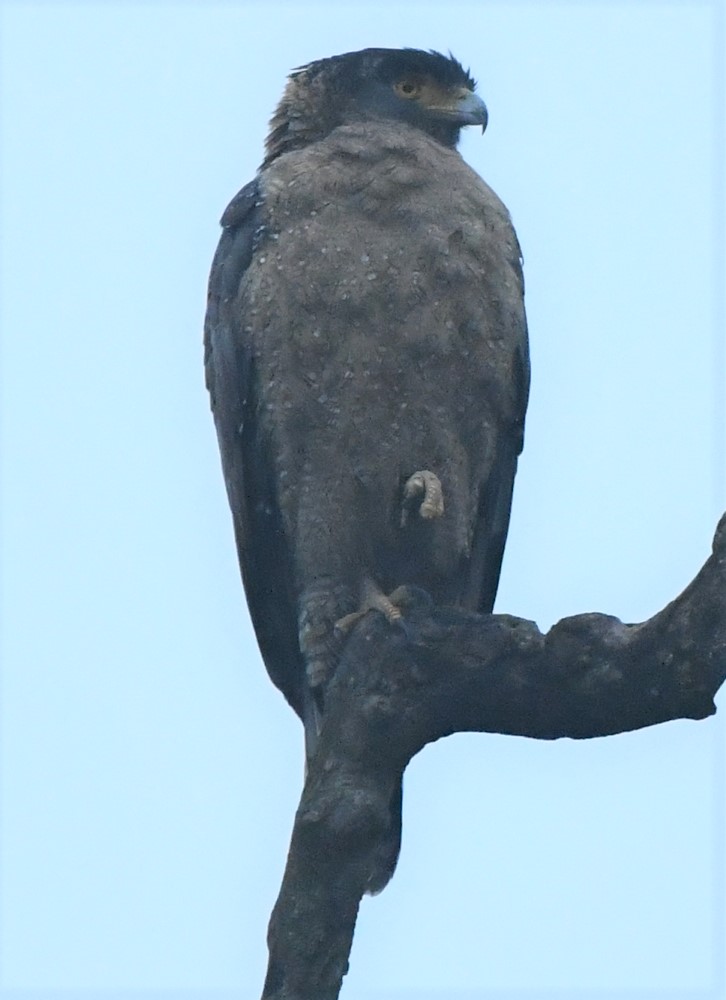
Hen Harrier (Circus cyaneus) 2 DH.
Changeable Hawk-Eagle (Nisaetus cirrhatus limnaeetus) 3 UBQ (photo).
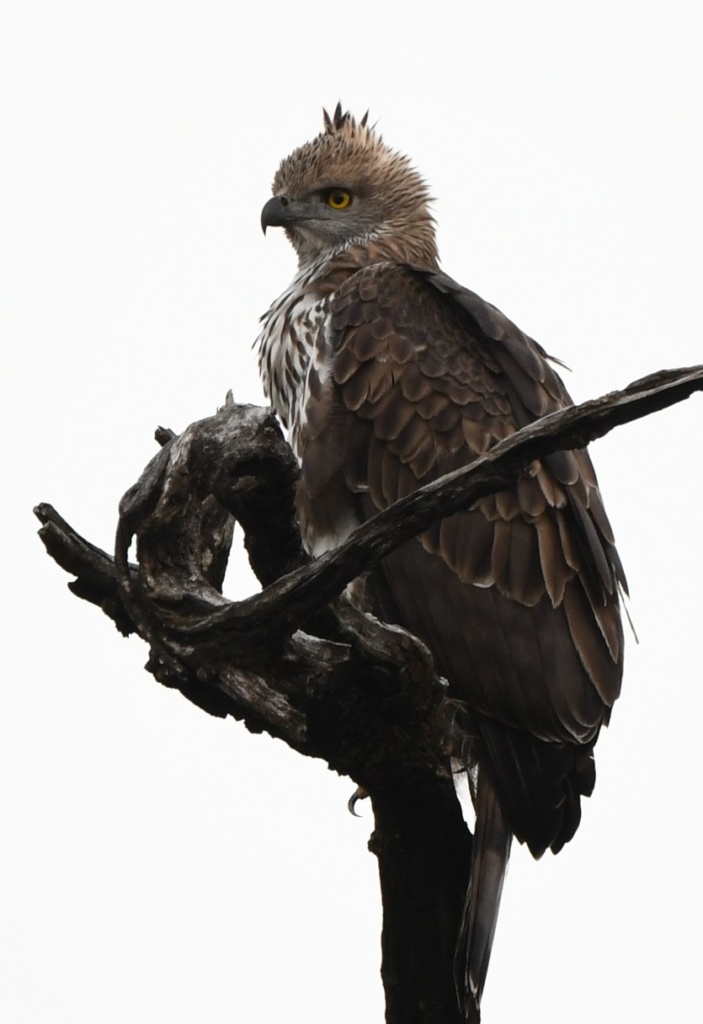
White-breasted Waterhen (Amaurornis phoenicurus) 1 RAMK.
Barred Buttonquail (Turnix suscitator) 2 BI.
Black-winged Stilt (Himantopus himantopus) 2 RAMK (photo).
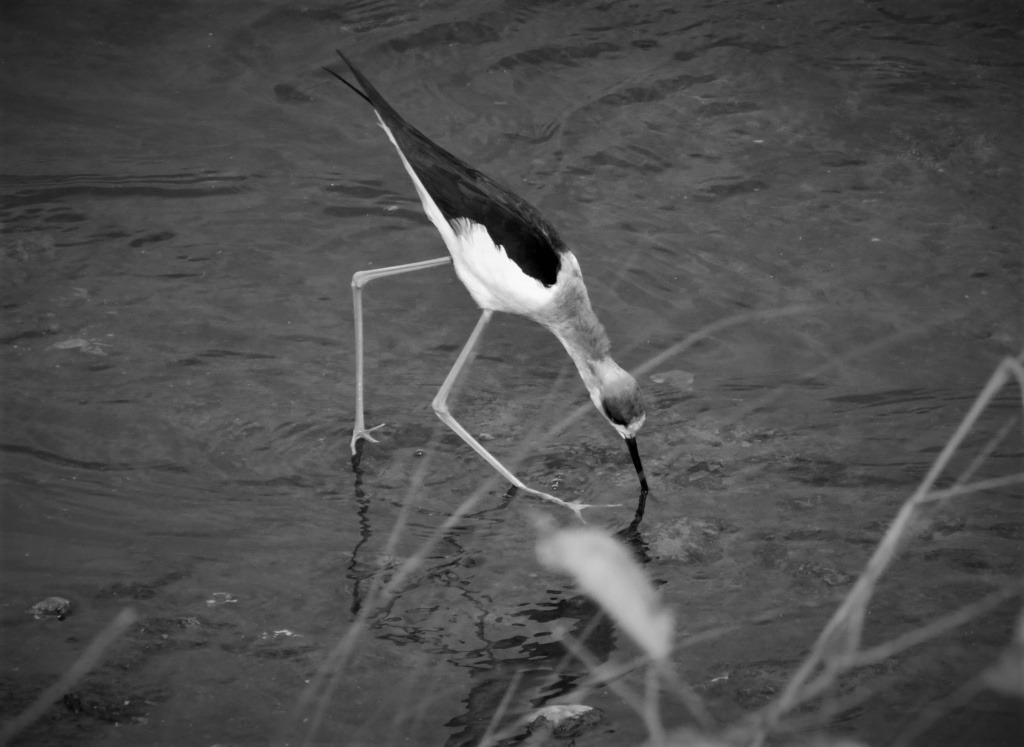
River Lapwing (Vanellus duvaucelli) 4 UBQ.
Red-wattled Lapwing (Vanellus indicus) 3 BI (photo), KOS, RAMK, JH (photo).
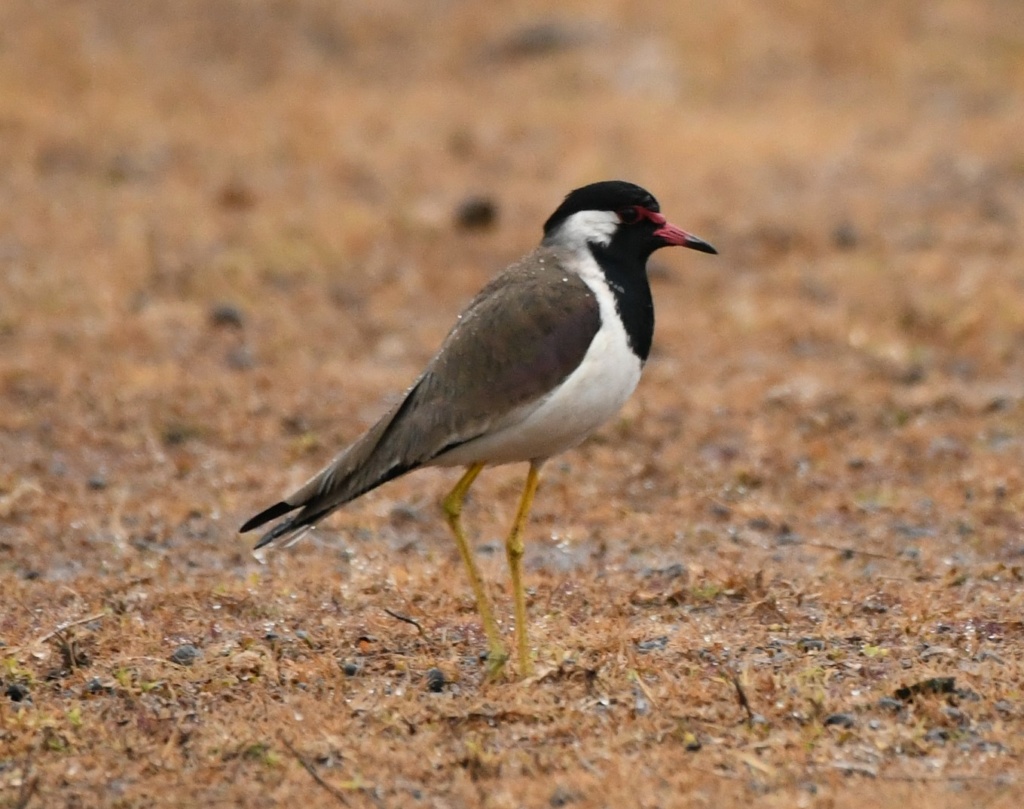
Little Ringed Plover (Charadrius dubius) 2 TAJ-KOS.
Common Greenshank (Tringa nebularia) 1 RAMK.
Common Sandpiper (Tringa hypoleucos) 4 UBQ.
River Tern (Sterna aurantia) 1 RAMRS.
Common Pigeon (Columba livia) 12 UBQ.
Spotted Dove (Streptopelia chinensis) 8 UBQ (photo).
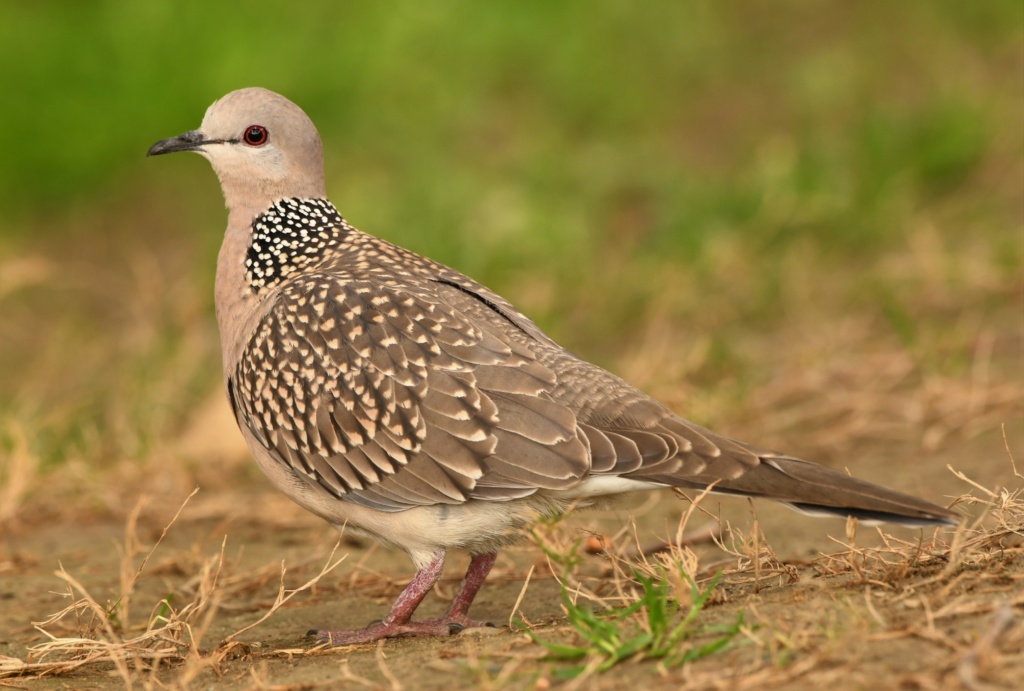
Plum-headed Parakeet (Psittacula cyanocephala) 10 gregarious in fruiting trees, BI, DH.
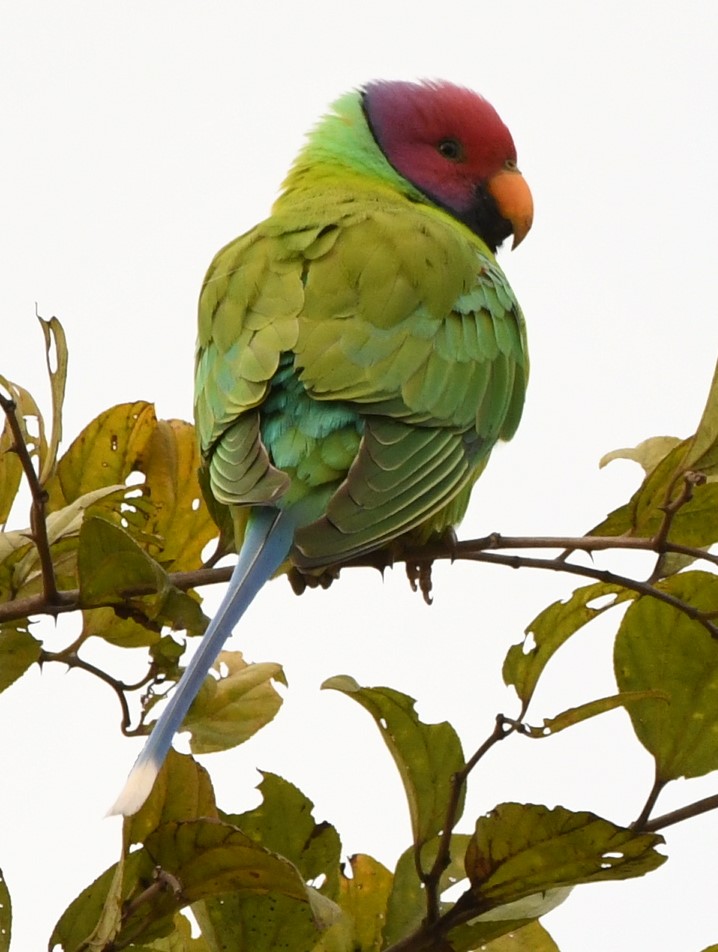
Red-breasted Parakeet (Psittacula alexandri) 8 gregarious, BI.
Greater Coucal (Centropus sinensis) 1 RAMK.
Jungle Owlet (Glaucidium radiatum) 2 on utility lines and in roadside trees, RAM-JH (photo).
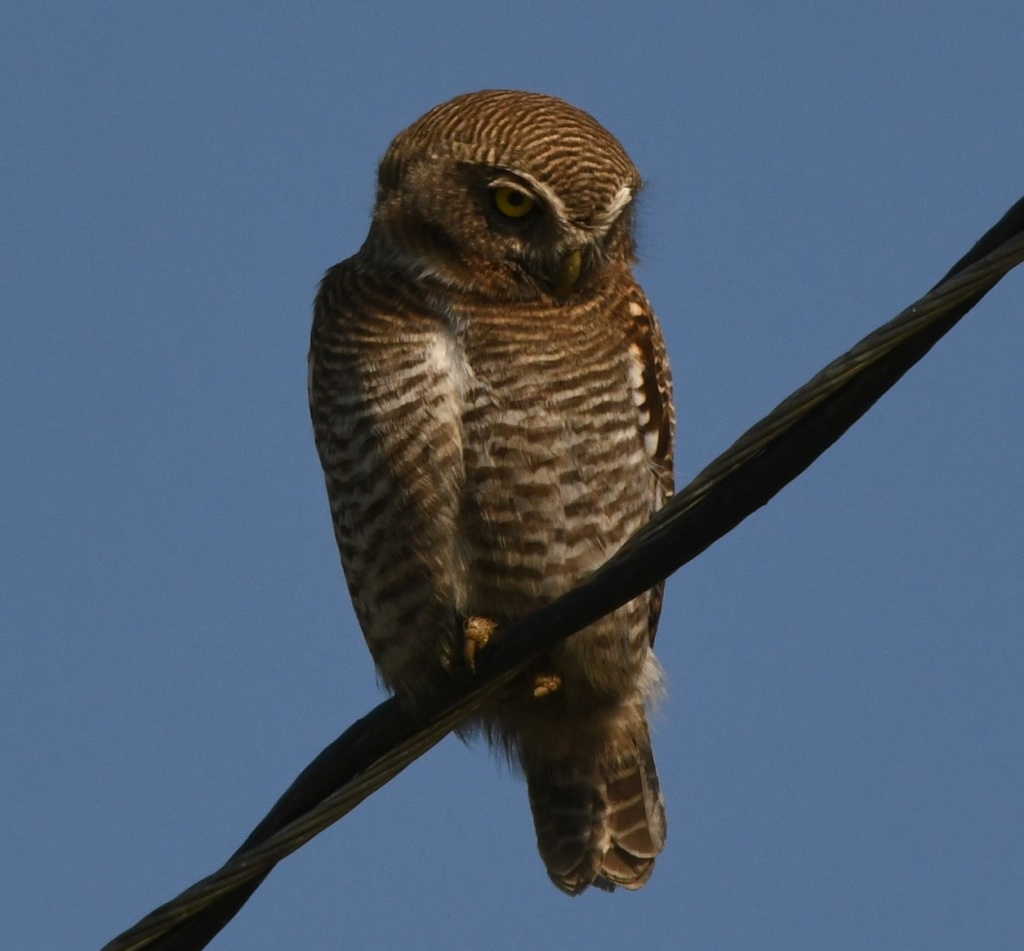
Brown Fish Owl (Ketupa zeylonensis) 1 flying between large trees next to temple parking lot, KOS.
Large-tailed Nightjar (Caprimulgus macrurus) 1 flying over riverside at dusk, KOS.
Crested Treeswift (Hemiprocne coronata) 4 gregarious, flying 100-200m above savanna.
Common Hoopoe (Upupa epops) 1 on roadway, DH (photo).
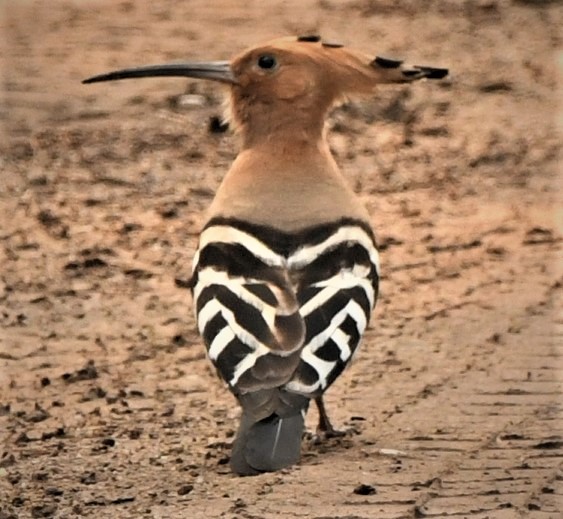
Stork-billed Kingfisher (Pelargopsis capensis) 1 in streamside tree, BI (photo).
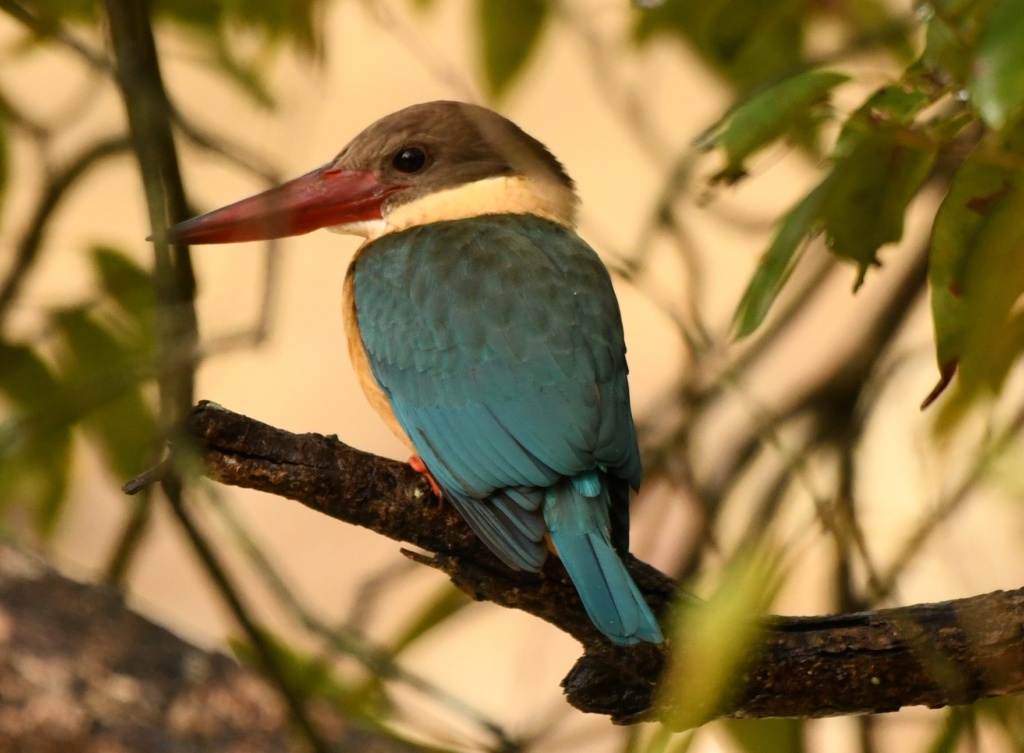
White-throated Kingfisher (Halcyon smyrnensis) 1 UBQ (photo).
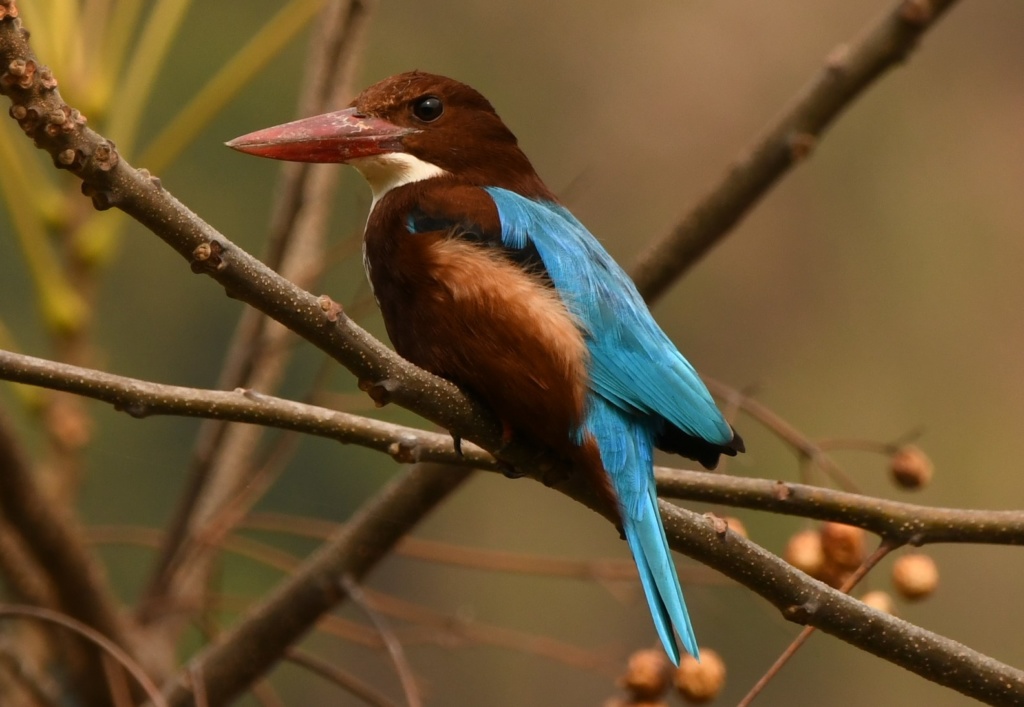
Common Kingfisher (Alcedo atthis) 2 UBQ.
Crested Kingfisher (Megaceryl lugubris) 2 gregarious, TAJ-KOS, BI.
Pied Kingfisher (Ceryl rudis) 1 TAJ-KOS.
Blue-bearded Bee-eater (Nyctyornis athertoni) 2 JH.
Indian Gray Hornbill (Ocyceros birostris) 4 gregarious in tall garden tree, TAJ.
Oriental Pied Hornbill (Anthracoceros albirostris) 3 TAJ, BI.
Great Hornbill (Buceros bicornis) 2 gregarious; flying between tall trees, BI.
Lineated Barbet (Megalaima lineata) 3 TAJ, BI. DH.
Great Slaty Woodpecker 3 gregarious, active in forest subcanopy; vocal and shy, BI.
Fulvous-breasted Woodpecker (Dendrocopus macei) 2 BI.
Streak-throated Woodpecker (Picus xanthopygaeus) 3; m,f, loosely gregarious; one on dead tree in clearing BI (photo).
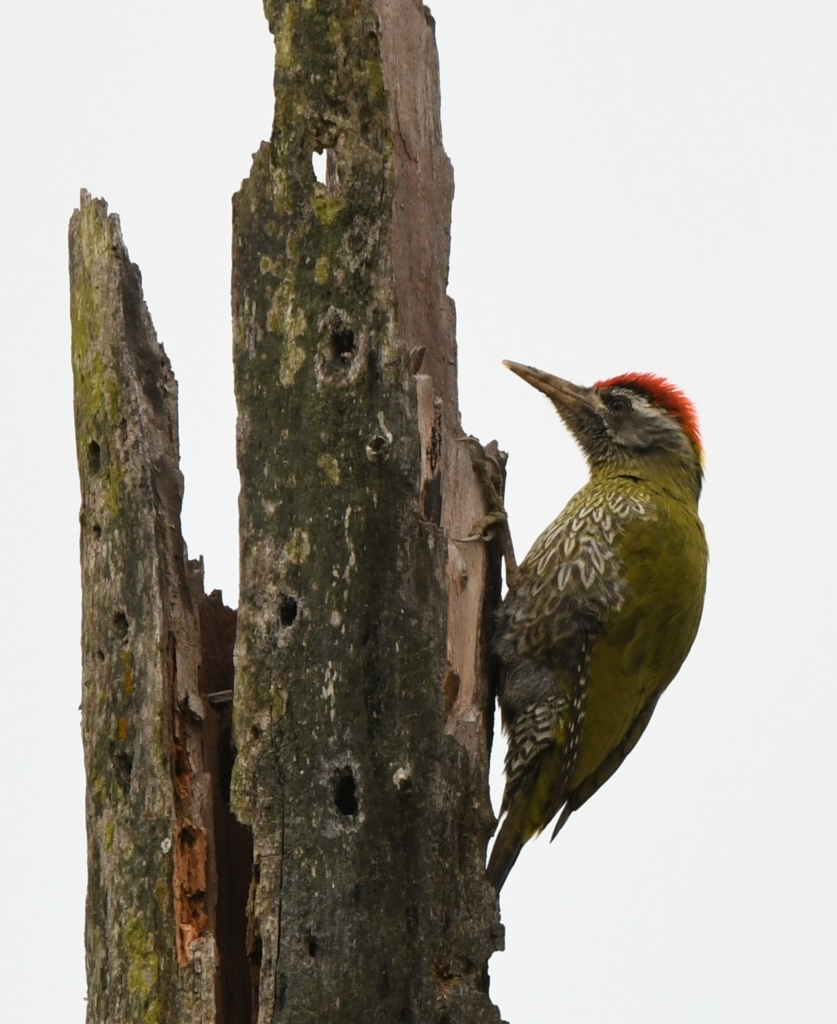
Gray-headed Woodpecker (Picus canus) 1 forest edge; working up trunk of large deciduous tree, BI (photo).
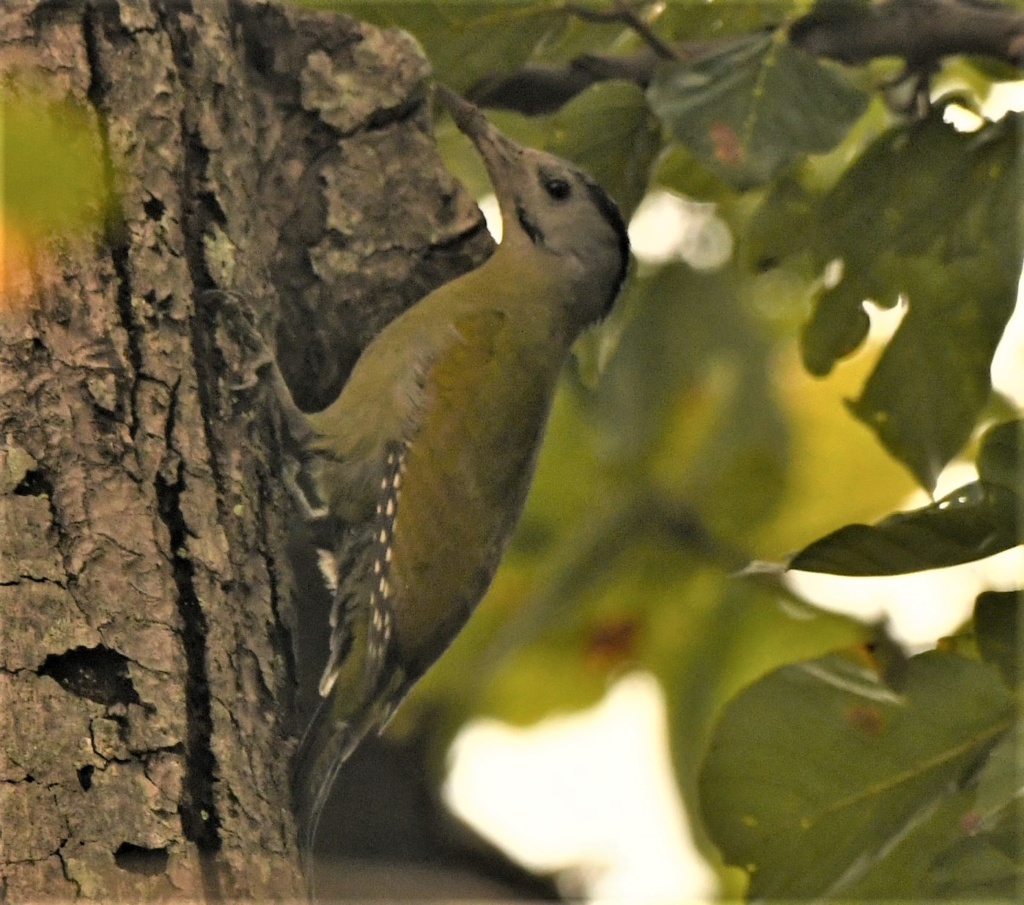
Himalayan Goldenback (Dinopium shorii) 1 DH.
Black-rumped Flameback (Dinopium benghalense) 1 DH (photo).
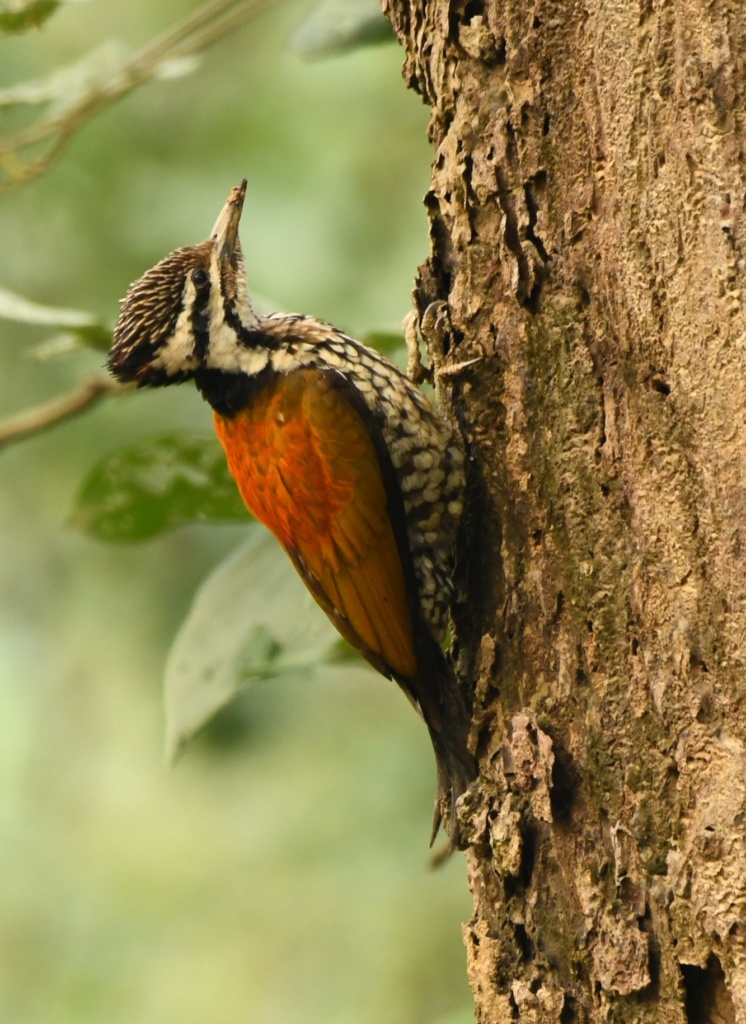
White-naped Woodpecker (Chrysocolaptes festivus) 1 JH.
Bar-winged Flycatcher-Shrike (Hemipus picatus) 2 often in late morning mixed sp. flocks, UBQ (photo).
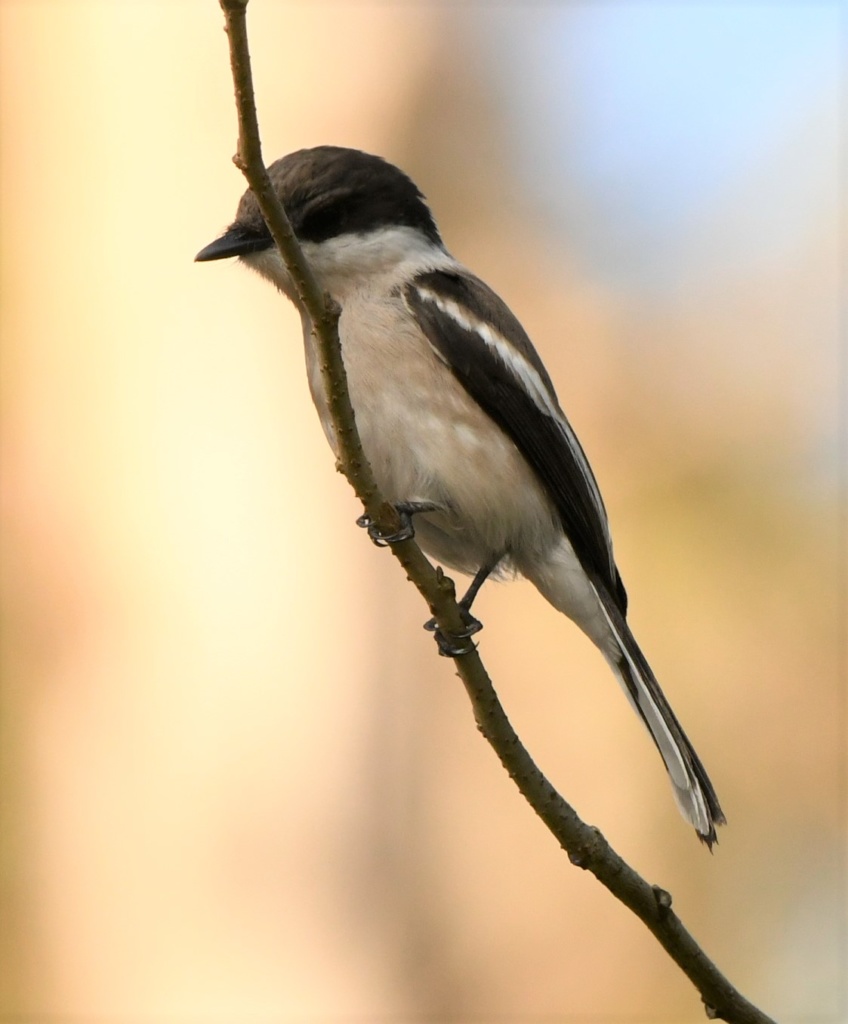
Common Iora (Aegithinia tiphia) in deciduous tree canopies, TAJ, BI.
Scarlet Minivet (Pericrocotus flammeus speciosus) 3 gregarious; riverside tree canopies, TAJ, BI, KOS (photo).
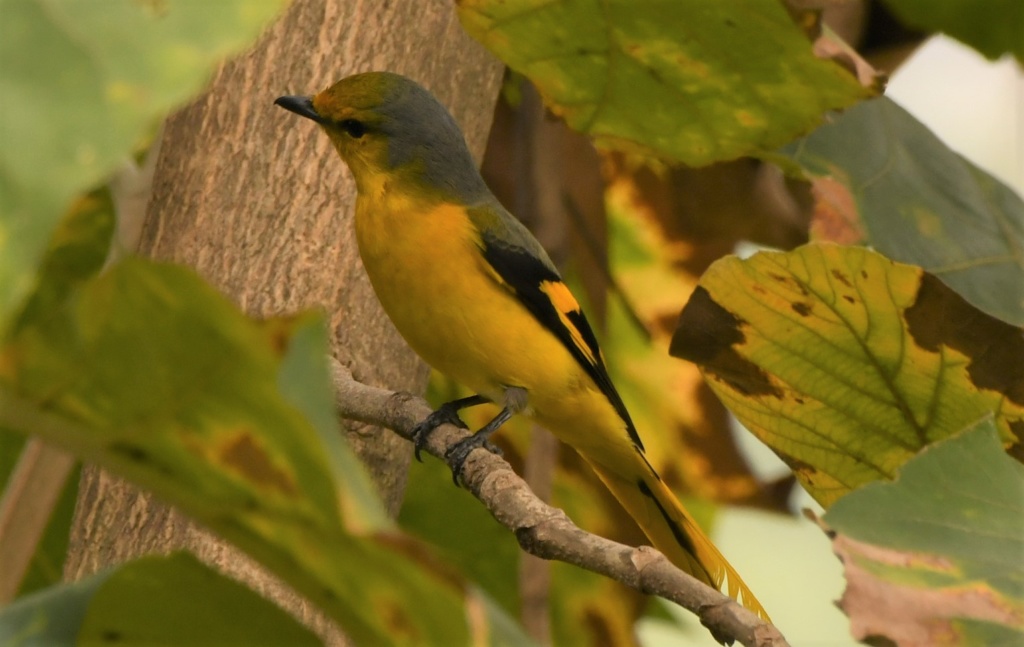
Long-tailed Shrike (Lanius schach) in an isolated tree, savanna, JH.
Black Drongo (Dicrurus macrocercus) 3 on roadway utility lines and trees, RAM, TAJ.
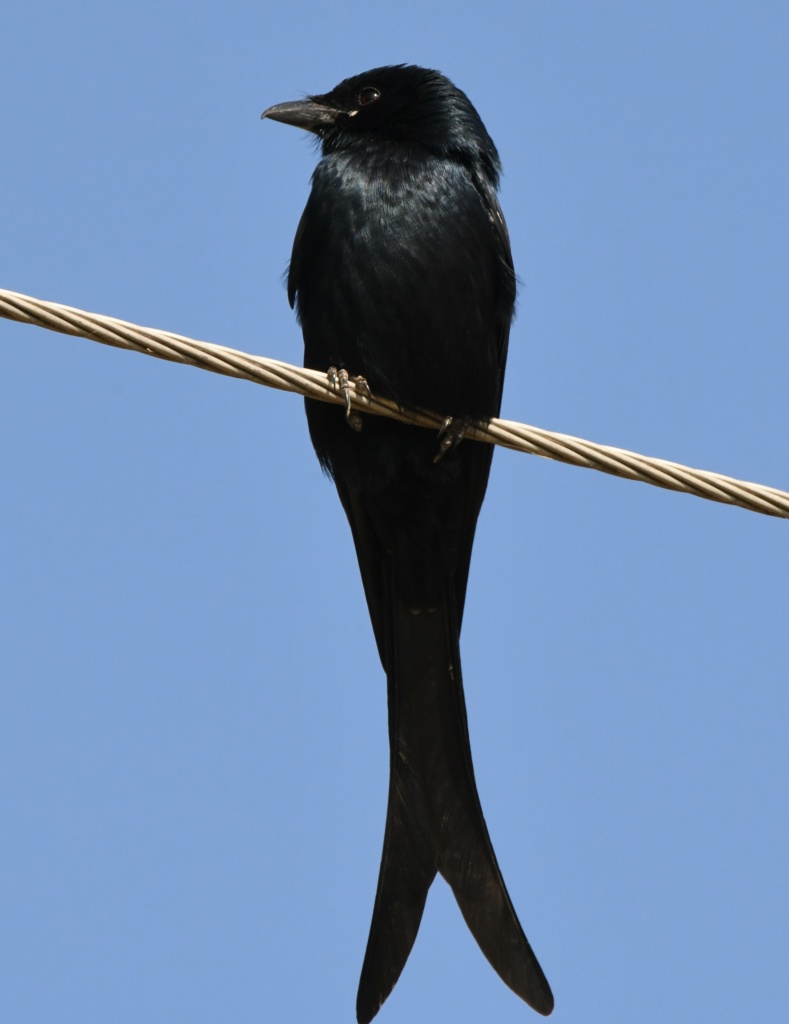
White-bellied Drongo (Dicrurus caerulescens) 3 gregarious in trees, BI.
Yellow-bellied Fantail (Rhipidura hypoxantha) 1 fast-moving in garden trees and shrubs msf with prinias, TAJ.
White-throated Fantail (Rhipidura albicollis) 3 often in late morning msf; UBQ (photo).
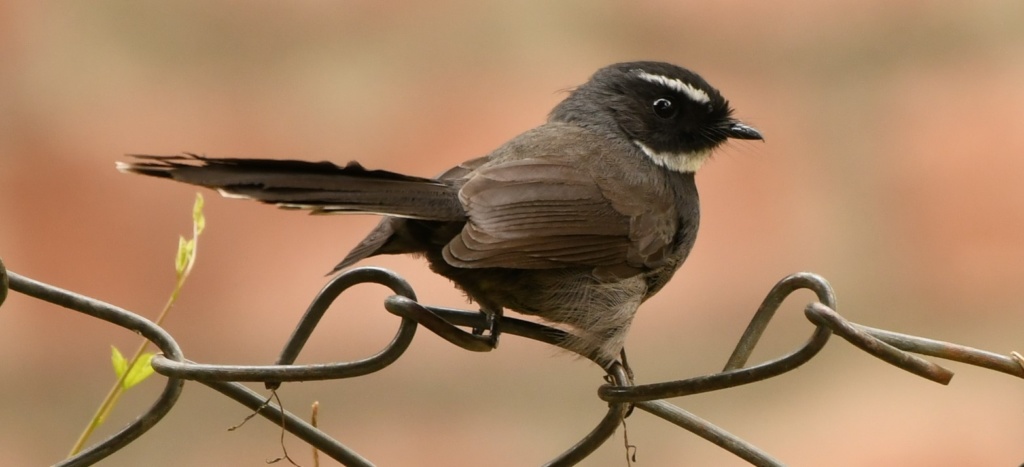
Rufous Treepie (Dendrocitta vagabunda) 1 vocal in tree tops, TAJ.
Large-billed Crow (Corvus macrorhynchos) 8 gregarious (mostly in pairs), UBQ.
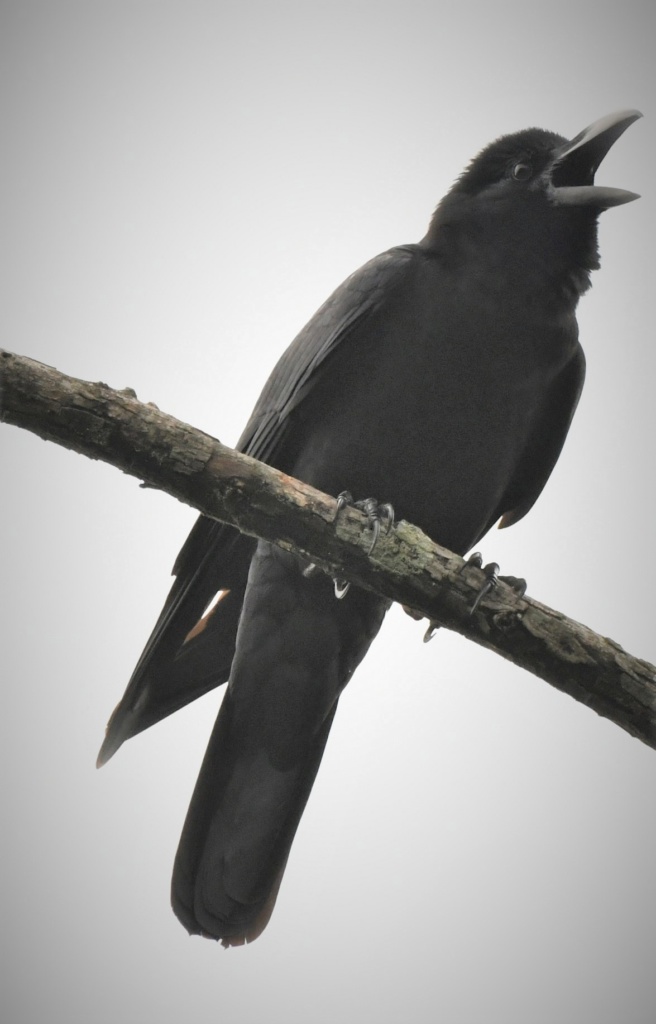
Great Tit (Parus major) 2 in canopy of tall garden trees, TAJ.
Plain Martin (Riparia paludicola) 2 gregarious; flying along drainage canal and river, RAM, KOS.
Barn Swallow (Hirundo rustica) 5 UBQ.
Red-rumped Swallow (Hirundo daurica) 3 gregarious, flying over drainage canal, RAM.
Himalayan Bulbul (Pycnonotus leucogenys) 4 gregarious; one holding ant in beak, UBQ (photo).
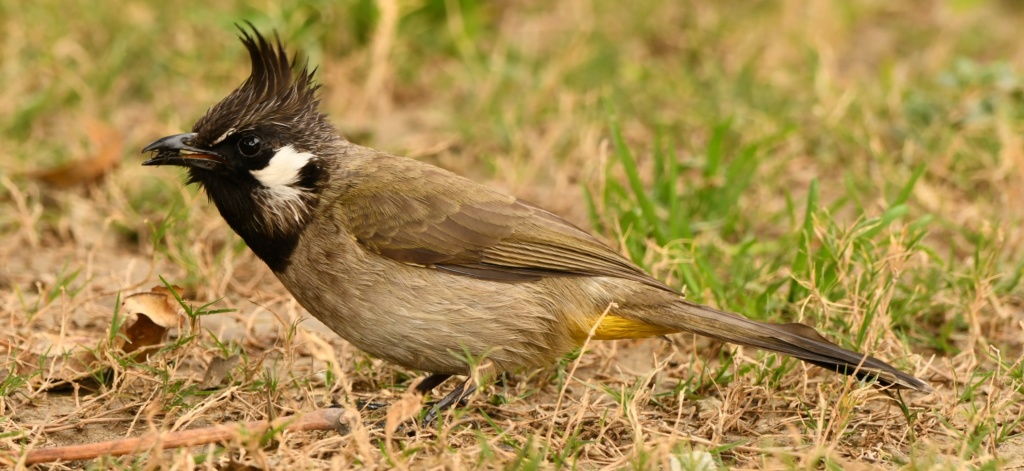
Black-crested Bulbul (Pycnonotus flaviventris) 1 in shrubs next to river, RAMK.
Red-whiskered Bulbul (Pycnonotus jocosus) 5 gregarious, UBQ.
Red-vented Bulbul (Pycnonotus cafer) 3 gregarious, UBQ (photo).
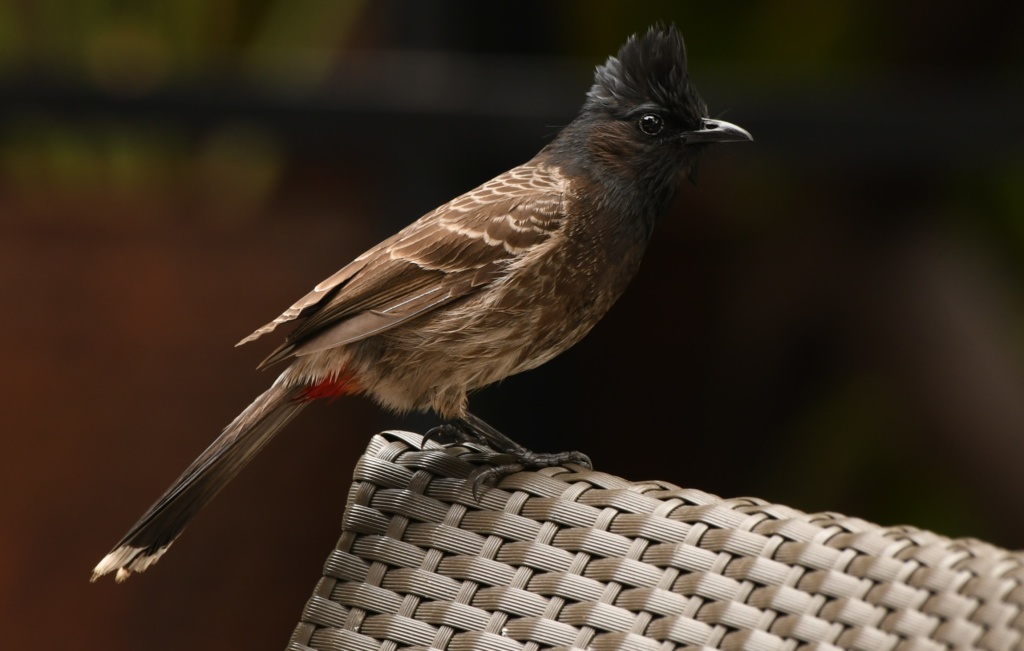
Black Bulbul (Hypsipetes leucocephalus) 2 in tall trees near river, KOS.
Gray-breasted Prinia (Prinia hodgsonii) 3 gregarious in shrubs and small trees, UBQ (photo).
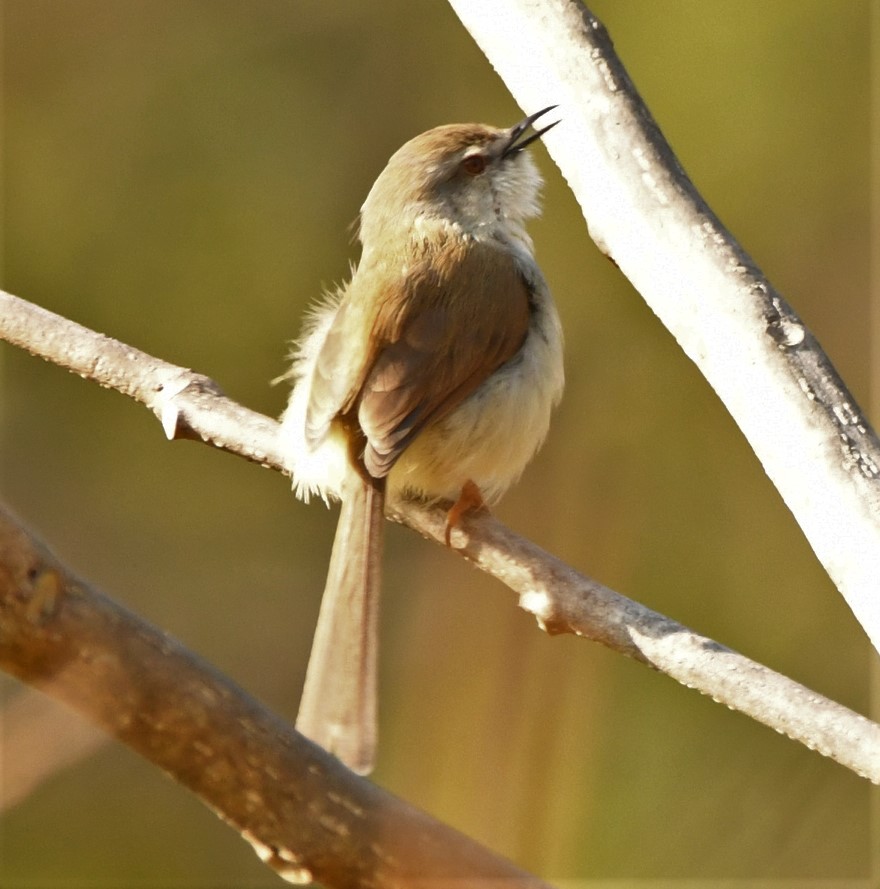
Ashy Prinia (Prinia socialis) 3 gregarious in low shrubs next to river, KOS.
Plain Leaf Warbler (Phylloscopus neglectus) 1 in small trees near river, RAMK.
Greenish Warbler (Phylloscopus trochiloides) 1 in ornamental trees, TAJ, RAM.
Jungle Babbler (Argya striatus) 5 vocal, gregarious, UBQ (photo).
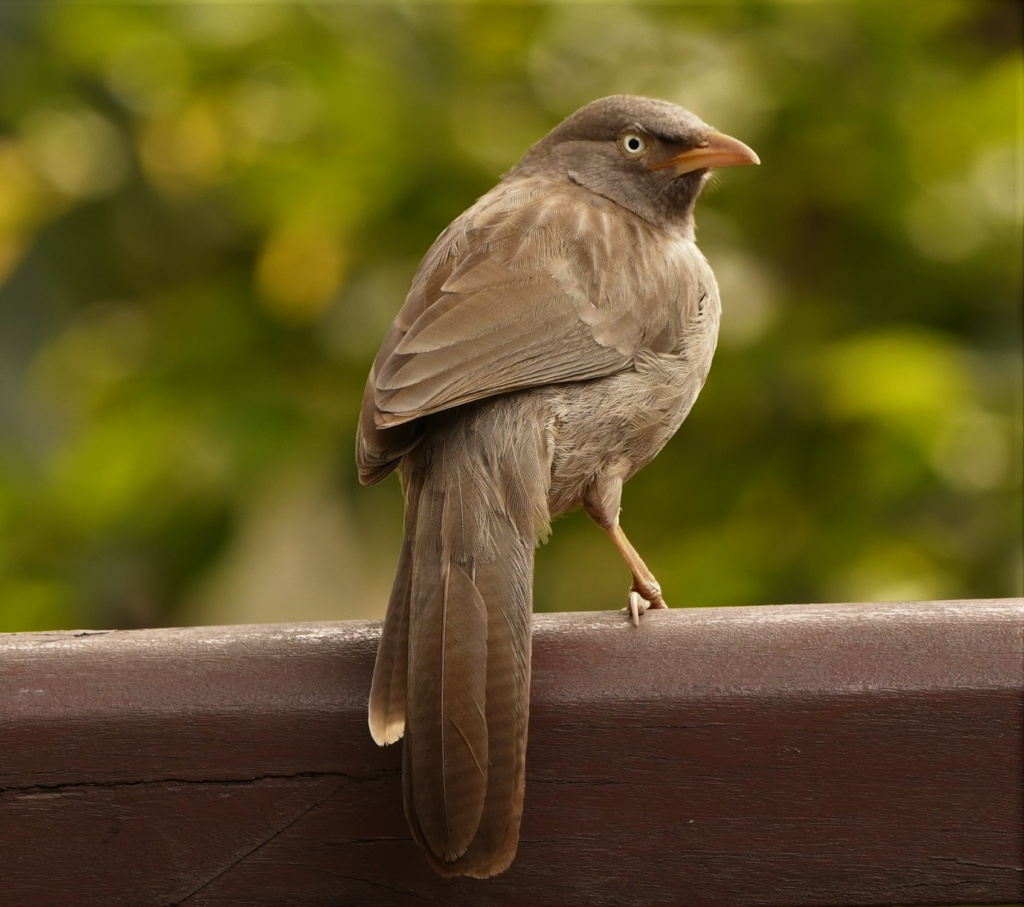
White-crested Laughingthrush (Garrulax leucolophus) 3 roadside shrubs, gregarious, JH
Oriental White-eye (Zosterops palpebrosus) 3 in trees and shrubs, UBQ.
Velvet-fronted Nuthatch (Sitta frontalis) 2 in mature trees, UBQ.
Bar-tailed Tree-creeper (Cerethia himalayensis) 1 on lower trunk of mature deciduous tree, BI.
Common Myna (Acridotheres tristis) 12 (ad, imm) gregarious; open fields with livestock, DK, KOS (photo).
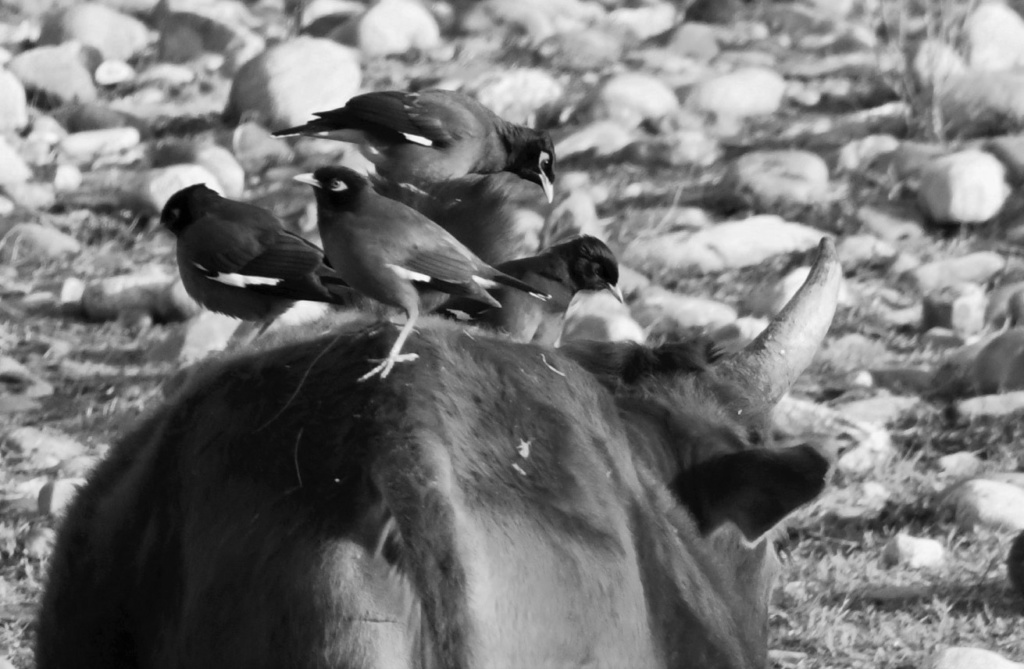
Blue Whistling-Thrush (Myiophonus caeruleus) 1 on ground beneath trees, near water, UBQ.
Black-throated Thrush (Turdus atrogularis) 1 edge of woodland, BI.
Oriental Magpie Robin (Copsychus saularis) 1 TAJ.
Indian Robin (Saxicoloides fulicata) 1 edge of woodland, BI.
Plumbeous Water- Redstart (Rhyacornis fuliginosus) 3 rocky streams, UBQ (photo).
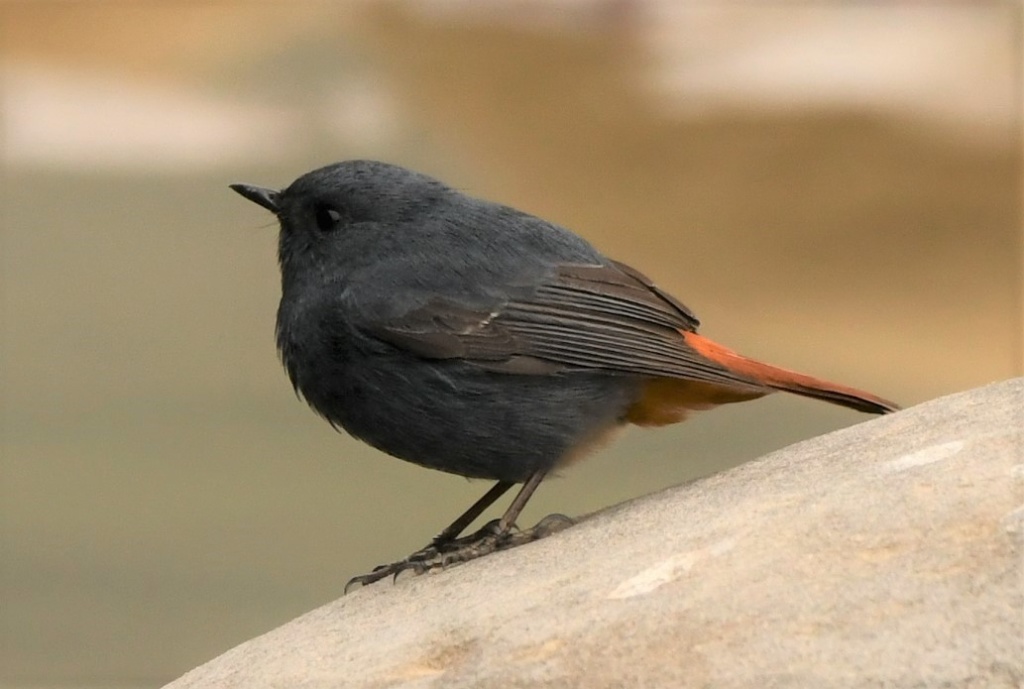
White-capped Redstart (Chaimarrornis leucocephalus) 3 rocky streams and edges, UBQ (photo).
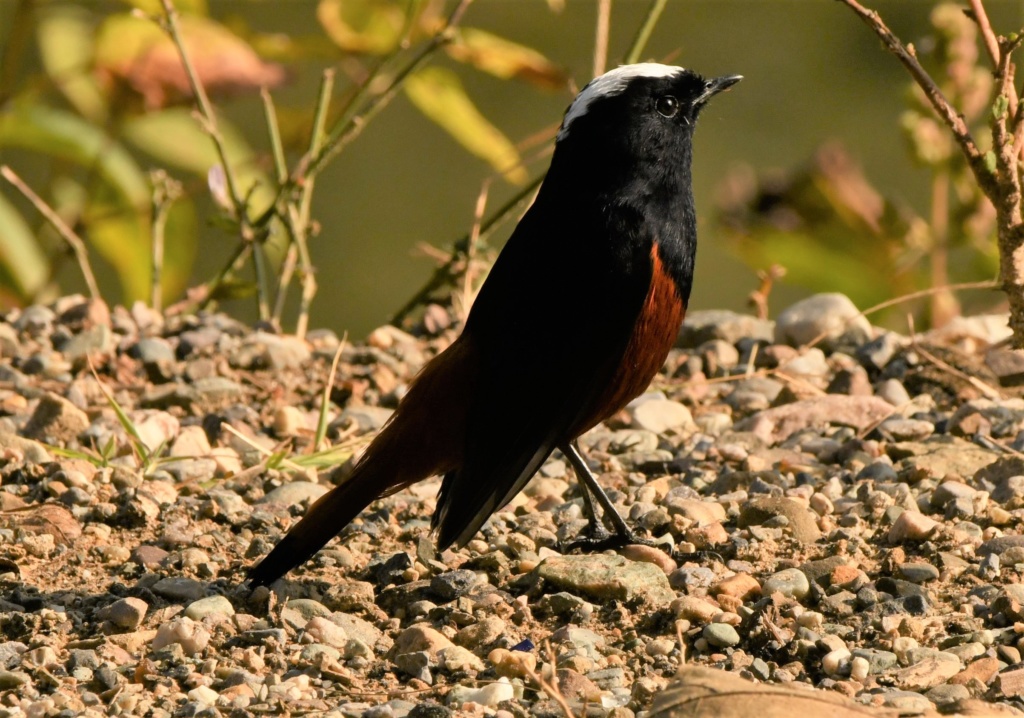
Common Stonechat (Saxicola torquata) 1 KOS
Gray Bushchat (Saxicola ferrea) 2 often in msf with Phylloscopus, Prinia, UBQ (photo).
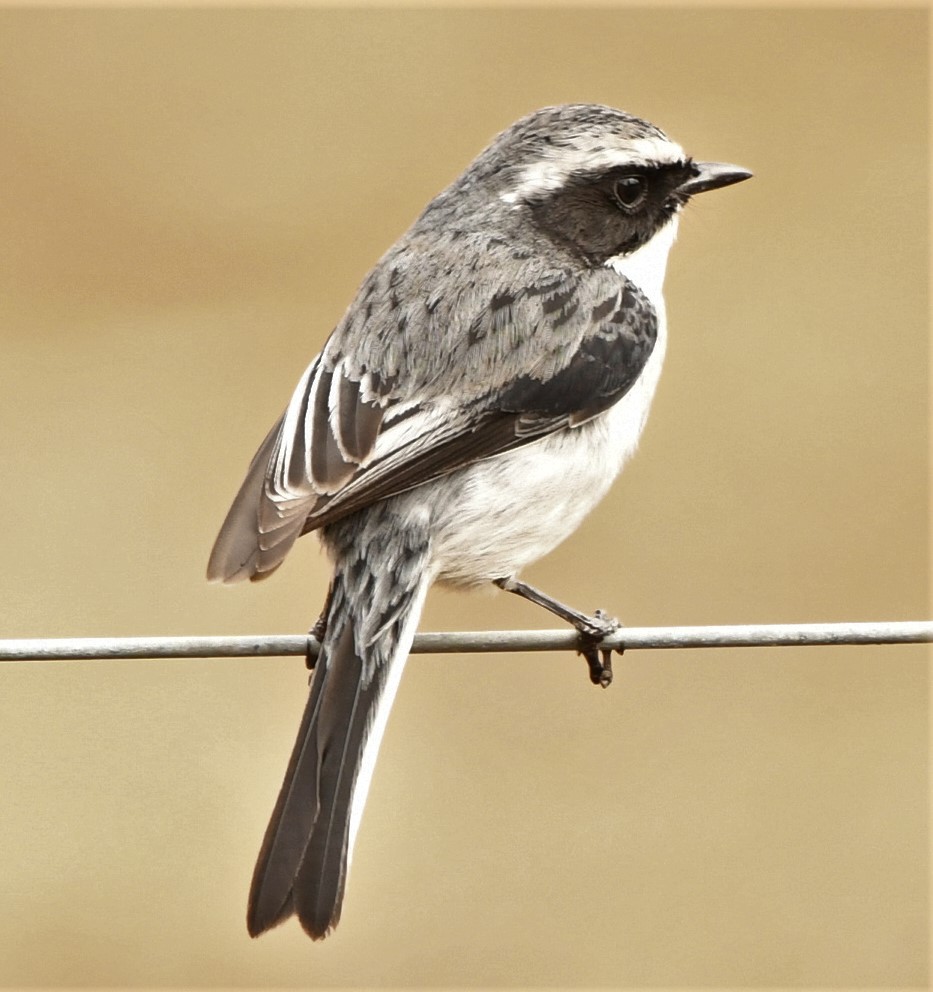
Blue Rock-Thrush (Monticola solitarius) 1 in parking area next to bridge, KOS.
Red-breasted Flycatcher (Ficedula parva) 1 brushy edge of garden, TAJ.
Gray-headed Canary-Flycatcher (Culicicapa ceylonensis) 1 roadside deciduous trees, BI.
Golden-fronted Leafbird (Chloropsis aurifrons) 1 garden tree canopy, TAJ.
Green-tailed Sunbird (Aethopyga nipalensis) 1 in shrubs next to river, KOS.
House Sparrow (Passer domesticus) 3 in riverside village, KOS.
Gray Wagtail (Motacilla cinerea) 3 usually near water, UBQ.
White Wagtail (Motacilla alba) 2 usually near water, UBQ (photo).
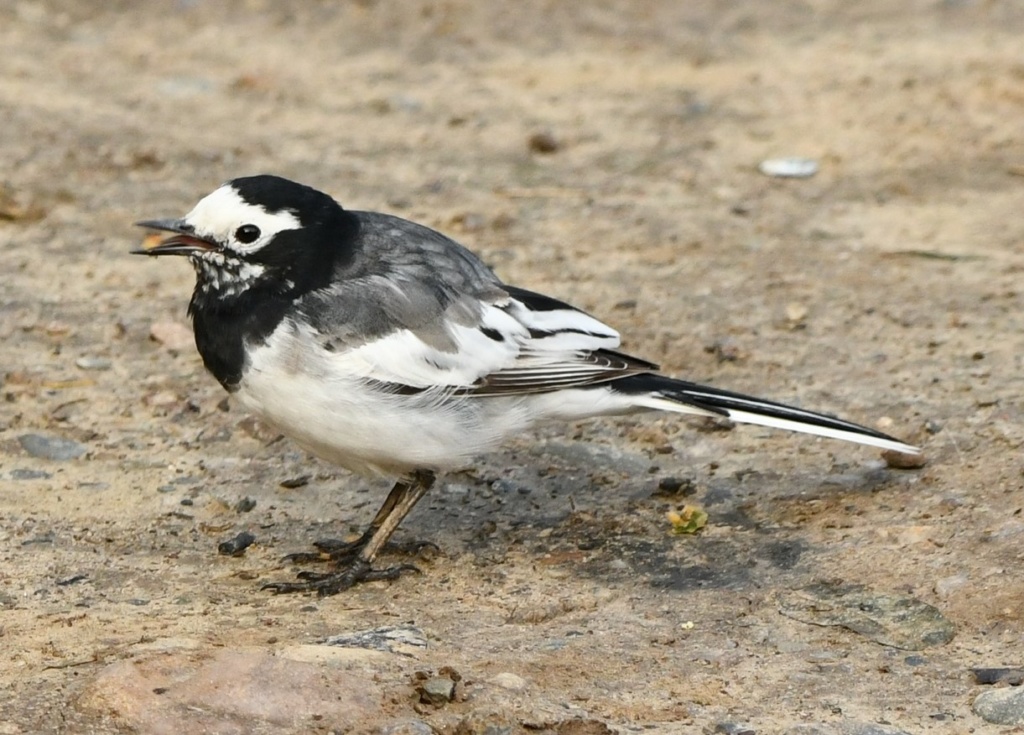
Tawny Pipit (Anthus campestris) 1 dry streambed, KOS (photo).
